BUNKERS, DATA AND ALL THE BIG STUFF

The “uber risks” that businesses in South-east Asia will run up against in 2023 should be manageable. But mind the (compliance) gaps.
TURNING BOLD PROMISES INTO CONCRETE PROGRESS: REFLECTING ON THE UK’S COP PRESIDENCY
The UK’s Regional Director for Southeast Asia on Climate and Energy, Tom Moody, reflects on the progress made since COP26 and regional opportunities.
WHY EUROPEAN CORPORATES SHOULD VENTURE BUILD IN ASIA
Being part of the next decades of growth in this region will require local approaches. Innovation from Europe won’t cut it anymore.
WHY NEW YEAR’S RESOLUTIONS SET YOU UP FOR FAILURE
Good intentions are the precursor to positive change. The problem is how we go about setting those good intentions and why they often set you up for failure.
ORIENT MAGAZINE NEW LOOK FOR 2023! Look inside for our 14-feature edition with new features! Issue 90 January 2023 orient-magazine.com
THE OFFICIAL MAGAZINE OF THE BRITISH CHAMBER OF COMMERCE SINGAPORE
Features
Issue 90 / January 2023
MEMBER PROFILES / IN FOCUS: NICK ALCHIN, HEAD OF COLLEGE, UWC SOUTH EAST ASIA
In this interview, recently appointed Head of College Nick Alchin outlines his vision and hopes for the future leaders they educate.
MEMBER PROFILES / A DAY IN THE LIFE OF OUR MEMBERS: DANIEL LEUNG, COUNTRY MANAGER, ACCA SINGAPORE
MEMBER PROFILES / A DAY IN THE LIFE OF OUR MEMBERS: JOHN FORRESTER, MANAGING PARTNER, HFW SINGAPORE LLP
COMMENTARY / TURNING BOLD PROMISES INTO CONCRETE PROGRESS: REFLECTING ON THE UK’S COP PRESIDENCY Contributed by the UK’s Regional Director for Southeast Asia on Climate and Energy, Tom Moody.
GLOBAL ISSUES / BUNKERS, DATA & ALL THE BIG STUFF
The “uber risks” that businesses in South-east Asia will run up against in 2023 should be manageable. But mind the (compliance) gaps. From Control Risks.
GLOBAL ISSUES / TIME TO RETHINK YOUR SUPPLY CHAIN
Companies with supply chains crippled by disruptions over the past two years would agree that there’s no better time than now to build one that is stronger, smarter and more resilient. From EY.
GLOBAL ISSUES / ASIA SITS ON FRONTLINE OF GLOBAL RISE IN MODERN SLAVERY
Identifying where, why and how your business might be affected is a priority in the face of more stringent human rights legislation. From Verisk Maplecroft.
ROAD TO NET ZERO / BA BETTER WORLDPUTTING SUSTAINABILITY AT THE HEART OF BRITISH AIRWAYS
Just over a year since launch, BA’s Director of Sustainability looks back on some of the progress made on the programme.
35 38 42 44
ROAD TO NET ZERO / COLLABORATION OPPORTUNITIES IN SINGAPORE & ASEAN’S GREEN ENERGY ECONOMY
Reflecting on our Energy and Utilities Committee’s SIEW Thinktank Roundtable.
SECTOR INSIGHTS / WHAT DOES THE FUTURE HOLD FOR THE GLOBAL MEDIA LANDSCAPE IN 2023?
Find out the ways global consumers adjusted their engagement with information and entertainment amidst various global phenomena. From YouGov.
BUSINESS SUPPORT / LEGAL KNOWLEDGE UPDATES - HIGHLIGHTS FROM 2022
There have been some developments covering areas such as fundraising, company registers and personal data. From CMS CMNO.
BUSINESS SUPPORT / WHY EUROPEAN CORPORATES SHOULD VENTURE BUILD IN ASIA
Being part of the next decades of growth in this region will require local approaches. Innovation from Europe won’t cut it anymore. From MING Labs.
BUSINESS SUPPORT / HOW FAR ARE YOU ON THE PATH TO BECOMING A DATA-DRIVEN COMPANY?
What does this journey towards being a data-driven company look like? From Zuhlke.
HEALTH & WELLBEING / WHY NEW YEAR’S RESOLUTIONS SET YOU UP FOR FAILURE
Good intentions are the precursor to positive change. The problem is how we go about setting those good intentions. From LEVITISE.
18
20 22 25
26 28 31 33
46
CONTENTS Issue 90 / January 2023
49
In Every Issue
PRESIDENT’S MESSAGE
Hear from our President, Damian Adams, on our key priorities and support for members
NEWS & HIGHLIGHTS
What’s been happening at the Chamber, at our member companies, in Singapore, in the UK and around the region

WELCOME TO OUR NEW MEMBERS
Find out who has joined our network
INSPIRATION FROM THE TOP
Learn a little wisdom from those at the top of their game
THE CONTENT MIX
Popular or recommended content to support your business and personal skills development, helping to generate new ideas for your business and team.


MEMBER DISCOUNTS
Save on travel, F&B, hotel, training, professional service and more. Available to members only.
8
5
12 14 15
51
CONTENTS Issue 90 / January 2023 3 / orient-magazine.com
HOW TO CONTACT US
Address: British Chamber of Commerce Singapore 137 Telok Ayer Street #06-03 Singapore 068602
Web: britcham.org.sg
Phone:
+65 62223552
Email: General: info@britcham.org.sg
Editorial & Advertising: marcoms@britcham.org.sg
Social: LinkedIn Instagram Twitter Facebook YouTube Flickr
Update your subscriptions: britcham.org.sg/newsletter
ORIENT MAGAZINE
JANUARY 2023
EDITOR / Lucy Haydon
CO-EDITOR / Khairil Faisal orient-magazine.com
THE BRITISH CHAMBER OF COMMERCE EXECUTIVE TEAM
EXECUTIVE DIRECTOR / David Kelly
DEPUTY EXECUTIVE DIRECTOR / Lucy Haydon
HEAD OF EVENTS / Ashni Degamia
HEAD OF MEMBERSHIP / Clare Hakes
EVENTS EXECUTIVE / Caitrin Moh
MARKETING & COMMUNICATIONS EXECUTIVE / Khairil Faisal
FINANCE MANAGER / Radhika Chauhan
OFFICE MANAGER / Anna C Garciso
THE BRITISH CHAMBER OF COMMERCE BOARD
PRESIDENT / Damian Adams, Watson Farley & Williams LLP
VICE PRESIDENT / Haslam Preeston, DFI Retail Group
SECRETARY / Nick Magnus, Dulwich College (Singapore)
TREASURER / Christina Mason, PwC
Andrew Clark, AsiaWorks
Andy Marr, 8build
Angel Cheung-Horenfeldt, Standard Chartered Bank
James Nesbitt, Standard Chartered Bank
Lissy Vadakel, British Council
Lorena Paglia, Microsoft
Michael Buchanan, Temasek International
Michael Yap, Coventry University
Penny Murphy, ERM
Simon Bennett, Swire Shipping
Simon Middlebrough, Singapore Aero Engine Services Ltd
Suzy Goulding, MSL Group
Steve Firstbrook, Department for International Trade
Issue 90 / January 2023 4 / orient-magazine.com
Welcome to your new-look Orient Magazine, which has undergone a design transformation for the new year.
I hope that you all enjoyed some well-deserved downtime over the festive holidays and have returned to your businesses refreshed and prepared for success in 2023 and the Year of the Water Rabbit. Since my last message in November, the British Chamber has hosted our first major networking event of the year, celebrating Chinese New Year, and launched this year’s International Women’s Day event , which takes place on 6 March. I hope to see many of you there for what will be a landmark event in this year’s calendar.
In the UK, a tough economic balance of interest rates, inflation and energy costs continues to dominate
President’s Message
the headlines, However, a strong focus continues to be directed from the UK towards the Indo-Pacific region, with Minister of State for Indo-Pacific Anne-Marie Trevelyan outlining opportunities in digital trade, green finance, manufacturing, and financial services in a speech given earlier this month at Asia House in London. In the months ahead, the Chamber will be hosting an Economic Briefing to keep members informed about global, regional and local economic issues.
We continue to experience high levels of interest from companies wishing to join our network, and we have for several months now seen an average of two new companies per week join the Chamber. With plenty of events planned in the calendar, I look forward to meeting many of you in person soon. We are also delighted and grateful for the support for the
Chamber from XCL Education and Redhill, our two new Annual Partners whom we warmly welcome to the membership.
I hope that you enjoy this latest edition of the magazine, which is packed with useful insights on topics including sustainability, supply chains, regional politics, the media landscape and more. Alongside Orient, don’t forget that you can access fantastic content and insights via the Chamber website, and don’t forget to check out the bi-weekly podcast on your favourite podcast platform.
My best,
Damian Adams President British Chamber of Commerce Singapore
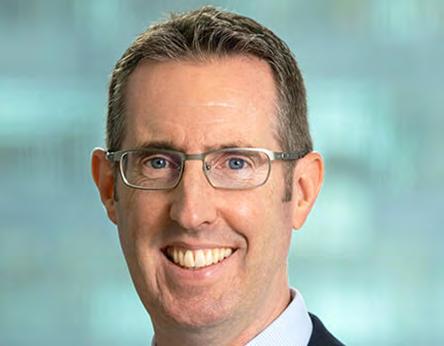
PRESIDENT’S MESSAGE Issue 90 / January 2023 5 / orient-magazine.com


/ AT THE CHAMBER
On the right, this year’s winner of the Celebrating Diversity Photography Competition, Stanley Cheah, with “Arts Performance”.

WELCOMING OUR LATEST ANNUAL PARTNERS
The Chamber has started the new year by introducing two new major supporters of our activities - XCL Education and Redhill.
XCL Education, a leading futurefocused family of schools which operates both the XCL World Academy and XCL American Academy in Singapore, will be working with us on a multi-term agreement on a range of engagements and activities.
Redhill, one of the fastest-growing full-service global communications agencies, will be partnering with the Chamber on our new Breakfast Insights series of events at our office, with content led by our expert Business Committees
THE RETURN OF THE GREAT BRITISH BALL
On 6th December 2022 in one of our final events of last year, the Chamber partnered with our colleagues at The British Club to host the Great British Ball, returning to the calendar for the first time since 2019.
Over 680 guests joined us for a festive evening of networking, a gala dinner and live entertainment. Download your photos from the 500+ available in the gallery here, and watch this space for details of the next edition!
THE WINNERS OF OUR CELEBRATING DIVERSITY PHOTOGRAPHY COMPETITION
On 17th January 2023 we held the prize ceremony for last year’s Celebrating Diversity Photography Competition, the annual community outreach activity organised by our Diversity and Inclusion Committee. This was the 6th year of the competition and the first in-person edition of the prize event since before Covid.
The event was kindly hosted at Eden Hall, the Official Residence of the British High Commissioner to Singapore, Her Excellency Kara Owen CMG CVO, who gave opening remarks.
The Chamber’s Official Diversity & Inclusion Partner, Barclays, was represented by Committee Chair Andrew Ashman, who, along with Susana Germino from Prize Partner, Swire Shipping, also made opening speeches before the winners were announced.
The winners:
• 1st Prize: Stanley Cheah, for “Arts Performance”
• 2nd Prize: Chek Poh Wong for “Celebrating NDP Together”
• 3rd Prize: Ngan Pin Goh for “Wave of Change and Celebration of Diversity and Inclusivity”
• Most Popular: David Hong, for “Celebrating Diversity in Different Religions”
NEWS
NEWS Issue 90 / January 2023 8 / orient-magazine.com
ENTERPRISE SINGAPORE LAUNCHES CALL FOR TRADE CHALLENGE AND BILATERAL UK-SINGAPORE R&D INNOVATION PROJECTS
Our partners at Enterprise Singapore have announced two opportunities for organisations to participate in funding projects.
The 4th edition of the Trade and Connectivity Challenge is seeking solutions that will address on-theground operational needs and drive partnerships in the aviation, maritime, land mobility, logistics and trade sectors. Global startups are invited to showcase their innovative solutions in key areas such as Sustainability, Supply Chain Resilience, Transport & Mobility and Robotics & Automation, with participants competing for funding grants and paid trials with challenge sponsors. The challenge statements can be found here, with applications to be made online before 1st March 2023
The UK-Singapore Collaborative R&D call for 2023 focuses on global challenges associated with an era of environmental, social and economic change. Through this bilateral initiative, Enterprise Singapore hopes to help Singapore companies seek project partners, and access funding, for joint-R&D and innovation projects with UK companies. From the UK perspective, last year inaugural call was a success, with £5million of Innovate UK funding. Over 50 joint proposals were received, 90 projects are being funded, supporting businesses across all parts of the UK.
An information webinar on the project is available on 14th February 2023 at 4pm SGT to learn more. Applications are to be made before 3rd May 2023
Organisations may wish to register on the partner matching platform to start looking for suitable project partners. For any enquiries, complete this form
BEYOND THE CHAMBER
Business news and opportunities from around Singapore, the UK, the ASEAN region and beyond.
THE UK’S MINISTER FOR THE INDO-PACIFIC, ANNE-MARIE TREVELYAN, OUTLINES THE CONTINUED RELEVANCE OF THE INDO-PACIFIC REGION
In a speech to Asia House on 25th January 2023, Minister Trevelyan shared that with 60% of global shipping passes through the IndoPacific, and more than half of global growth projected to come from the region by 2050, the UK must have a strategic focus facing the region.
To ensure the UK can strengthen its resilience, and protect its security, the country needs to strengthen partnerships with likeminded states, the Minister went on to say. The Indo-Pacific is home to many who are – like the UK – committed to territorial integrity, freedom from economic coercion, and the open market. A first step was to secure the UK’s ASEAN Dialogue Partner status, and the agreed Plan of Action.New Free Trade Agreements have been negotiated and existing FTAs re-negotiated around the region, with first-of-itskind digital economy agreements made with Singapore and Japan. The UK is on course to be the first European country to accede to the CPTPP, with a joint GDP of £9trillion and the removal of tariffs on 95% of all goods traded.
The Indo-Pacific is also on the frontline with many littoral communities threatened by rising seas, typhoons and millions at the mercy of drought, with UK climate change partnerships mobilising billions of pounds in green finance, including the UK’s Climate Action for a Resilient Asia Programme, which will support up to 14 million people to adapt to climate change.
CHAMBER MEMBERS FEATURE IN BLOOMBERG GENDER EQUALITY INDEX

Congratulations to our members named in this month’s Bloomberg Gender-Equality Index (GEI)abrdn, BAE Systems, Bank of America, CBRE, Diageo, HSBC, JLL, NatWest Group, Prudential plc, Societe Generale, Standard Chartered Bank, and Unilever.
The GEI is based on the data disclosed with performance against 5 key components of the Bloomberg GEI Framework, in comparison with the company’s industry peer group.
The pillars are:
• leadership and talent pipeline
• equal pay and gender pay parity
• inclusive culture
• anti-sexual harassment policies
• external brand.
NEWS /
NEWS Issue 90 / January 2023 9 / orient-magazine.com
RECAP / HIGHLIGHTS
Catch up with the latest digital content and highlights. Photo galleries from our major events can be found on our Flickr channel, with upcoming events here
FROM THE KNOWLEDGE BANK
How much do you really understand about sustainable finance? In a recap from the MoneyLIVE APAC conference, new members Gobeyond Partners shared key insights on why companies are pursuing sustainable finance, the common obstacles they face, and what can be done to encourage sustainable finance efforts. Read the full story here
The key drivers behind the interest were identied as:
1. Changing Regulations - new rules are coming being implemented as governments aim to play a significant role in the push for organisations towards sustainable finance. The need to abide by rules in such a regulated industry often puts pressure on financial institutions to accelerate change (but often not at the same pace as a profit-focused initiative for example.)
2. Customers expect it - the scale of sustainable finance is still relatively small, but we have all witnessed an influx of investors considering and acting upon their ESG considerations in the last few years. Concerns over climate change, human rights and equality all play an increasing part in their decision-making.
3. Demographics are reinforcing changethere is now a much larger demand for sustainable products and services by younger generations. Millennials are pushing demand for more sustainable investment offerings from financial institutions. According to KPMG, 81% of millennials were keen to know more about responsible investing and are twice as likely as older generations to want their pensions to be invested responsibly.
4. Institutional weight is behind it - linked closely to the above point on demographics, institutional investors are building ESG into their corporate strategy, with shareholders and clients expecting a broader range of investment opportunities. Organisations are also divesting from companies involved in unsustainable industries like fossil fuels, mining, and tobacco, which shifts market focus considerably.
ON THE BRITCHAM SINGAPORE PODCAST CHANNEL


Since our last Orient edition we’ve published six new episodes of our podcast, on the topics of sustainability, sustainable finance, education, leadership and fraud
Ep 151: The Compassionate Systems Framework with Jacob Martin, Deputy Head of College of Dulwich College
Ep 152: In Conversation - UK International Education Champion, Professor Sir Steve Smith
Ep 153: Journey to Sustainable Finance, Eric Lim, CSO, UOB Bank
Ep 154: Journey to Sustainable Finance, Joost Bilkes, Head of Impact Advisory Services, Credit Suisse
Ep 155: Sustainability Ambassadors (students) from Dulwich College (Singapore)
Ep 156: Understanding the World of Fraud and Scams
Access all episodes on our website or from your favourite podcast player, including Apple Podcasts, Spotify, Google Podcasts, Amazon Music, Audible, and many more.
RECAP Issue 90 / January 2023 10 / orient-magazine.com


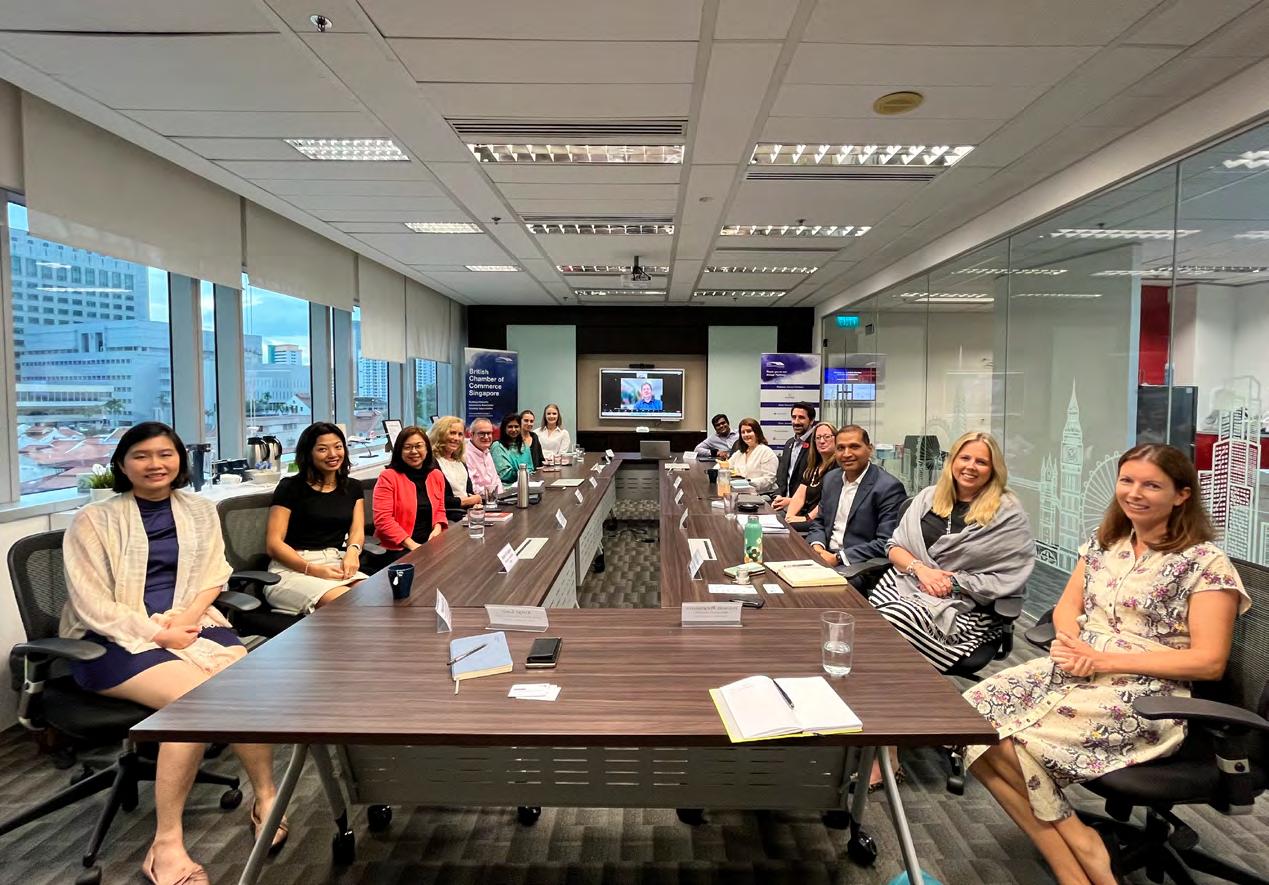


 Hosting Minister for Manpower Tan See Leng in our office, November 2022
The Great British Ball, December 2022
Sustainability reporting roundtable with the University of Birmingham, November 2022
Leadership Trust roundtable with Lord Westbury MBE, January 2023
Chinese New Year Networking, January 2023
Hosting Minister for Manpower Tan See Leng in our office, November 2022
The Great British Ball, December 2022
Sustainability reporting roundtable with the University of Birmingham, November 2022
Leadership Trust roundtable with Lord Westbury MBE, January 2023
Chinese New Year Networking, January 2023
Issue 90 / January 2023 11 / orient-magazine.com
Launch of the G20 Series with Ambassadors, High Commissioners, Chamber Presidents and trade officials from the UK, Canada, Italy, Latin America and Mexico, January 2023
WELCOME TO OUR NEW MEMBERS
Since our last Orient edition in November 2022, the Chamber has welcomed a host of new member companies to our network. To contact them visit the Membership Directory on our website or reach out to our team.
OSLER HEALTH INTERNATIONAL
Osler Health International is a family GP clinic offering healthcare services to adults, teenagers, children and babies. Whether you have been in Singapore for a long time, or have just arrived, we are here to provide a caring and personalised service that is based on your needs.
Visit www.osler-health. com
BETTER URBAN FARMS
Investment, consulting and advisory business focusing in the Agritech enabling technology space for food and non-food indoor farming. Working with early stage start-ups to support growth and cultivating collaborative IP creation for new IP.
Visit www.bufarms.com
WIREDSCORE
WiredScore sets the global standard for technology in the built world through certification and education. A champion of cutting-edge technology in real estate, WiredScore evaluates, improves, benchmarks and promotes digital connectivity and smart technology in homes and offices on a global scale, ensuring that buildings provide a bestin-class infrastructure that businesses and individuals require to thrive.
Visit wiredscore.com.
THE ASCENT GROUP
ASCENT is an independent global fund administrator dedicated to providing customized one stop solutions for our clients, including fund folutions, corporate solutions, and fintech solutions. We are the homegrown global fund administrator, founded in 2019, headquarted in Singapore.
Visit www.theascent-group. com
JK MEDORA PAC
JK Medora PAC is an eminent boutique firm committed to constructive professional service. That commitment is expressed in the interest we take in our clients’ business and the value and operational benefits our clients obtain from our advice. We blend big firm expertise and capability with boutique firm service.
As part of the active interest we take in our client’s business, we offer year round support to help. We are a member of DFK International, a top 6 association of international accounting firms with more than 400 offices across the world.
Our services include liquidations, valuations, forensics, data analytics, audit and assurance, international corporate tax, company secretarial and family office setup.
Visit www.jkmedora.com. sg
GOBEYOND PARTNERS
Customer behaviour is changing. But many organisations are not keeping pace. With legacy systems, cost pressures, and agile new competitors, businesses need to think differently about the way they look at things.
Gobeyond Partners is a new type of consulting firm that partners with you to solve complex customer journey challenges. By combining deep sector expertise with an award-winning approach to client service and value, we bring your transformation vision to life.
As part of the Webhelp group, our people understand what it takes to deliver great customer experience.
Visit www.gobeyondpartners.com
MEMBER PROFILES /
MEMBER PROFILES Issue 90 / January 2023 12 / orient-magazine.com
UTMOST INTERNATIONAL
Utmost International is a leading provider of insurance-based wealth solutions through its Utmost Wealth Solutions business, and provides employee benefits through its Utmost Corporate Solutions business.
Utmost International operates in attractive markets across the UK, Europe, Latin America, Asia and the Middle East where we see continued, strong demand for our products. Our solutions are based on unit-linked insurance policies which are simple, well regulated and provide a tax-efficient savings vehicle.
Visit utmostinternational. com.
ELLIOTT SCOTT HR
Elliott Scott HR is an award-winning specialist in HR recruitment. We serve the global HR community through our offices located in Delhi, Hong Kong, London, New York, São Paulo and Singapore and have placed HR leaders in over 30 countries.
Visit www.elliottscotthr. com
AI SHOPHOUSE
Singapore-based consultancy that provides consulting, workshop and training services to increase AI literacy and inclusive collaboration.
Visit www.aishophouse. com
KANTAR SINGAPORE
Kantar is a data and evidence-based agency providing insights and actionable recommendations to clients, worldwide.
We have a complete, unique and rounded understanding of people around the world: how they think, feel and act, globally and locally in over 90 markets.
We don’t just help clients understand what’s happened, we tell them why and how they can shape the future.
Visit www.kantar.com
BIBBY FINANCIAL SERVICES
Bibby provides flexible funding facility that releases funds tied up in outstanding customer invoices quickly and professionally.
Visit www.bibbyfinancialservices.sg
APTITUDE SOFTWARE
We are born out of finance, and understand the complexities and challenges faced by the CFO. We meet the needs of the finance function to transform the way they work, and have watched as the CFO has evolved from just financial operations to a more strategic role focusing on revenue generation, sustainability and market adaptability.
Digital Finance objectives
Reduce the cost of the finance function with operational efficiencies; Surface real-time insights to help accelerate business growth; Centralize accounting rules and processes; Create a trusted view of finance; Reduce manual intervention and business risk by process automation.
As the subscription economy booms, it’s appeal to businesses and those responsible for revenue growth, is evident. For this reason, in 2021, we acquired MPP Global, a specialist subscription management platform which focuses on complex, enterprise subscription solutions.
Visit www.aptitudesoftware.com
SOVEREIGN MANAGEMENT SERVICES
Sovereign Corporate Services offers company formation and management in all major jurisdictions, together with the comprehensive advice and support that will assist companies of all sizes to establish business operations successfully in foreign markets. Sovereign has been involved with the set up and administration of an estimated 20,000 structures worldwide since 1987. We have established a network of offices or agents in all major international finance centres and now employ, directly, well in excess of 400 trained and experienced staff throughout the world.
Sovereign’s Private Client services have been developed to assist families and entrepreneurs around the world to structure their assets in a way that will help to grow their wealth now and preserve it for future generations.
Visit www.sovereigngroup. com

NEW MEMBERS
INSPIRATION FROM THE TOP

“In a busy marketplace, not standing out is the same as being invisible.”
- Seth Godin, Author
INSPIRATION
FOR THE BOOKSHELF
INSPIRATION / THE CONTENT MIX
Popular or recommended content to support your business and personal skills development, helping to generate new ideas for your business and team.
MICHELLE OBAMA: THE LIGHT WE CARRY
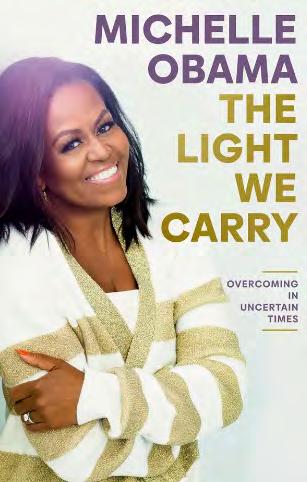
In an inspiring follow-up to her critically acclaimed, #1 bestselling memoir Becoming, former First Lady Michelle Obama shares practical wisdom and powerful strategies for staying hopeful. and balanced in today’s highly uncertain world.
THE DIARY OF A CEO WITH STEVEN BARTLETT

A few years ago Steven was a broke, a university dropout, living in a studio-flat in a rough area. At 18 he started a company which would eventually become “Social Chain”an industry leading marketing company. At 26 the company was generating $600m a year in revenue. At 27 he resigned as CEO, and launched ‘The Diary Of A CEO’ podcast with the simple mission of un-filtering success and giving you the knowledge you need to create the life you want.
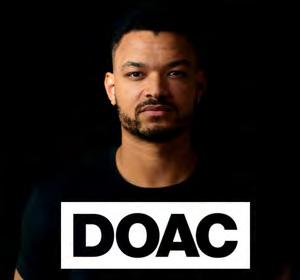
BBC: UNDERSTAND THE ECONOMY
From inflation to GDP, from the stock exchange to bonds, Tim Harford from the BBC goes back to basics to explain the terms we hear every day, and what they mean for you.
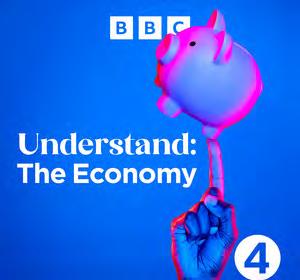
TREY GOWDY: START, STAY OR LEAVE
The Fox News host and #1 New York Times bestselling author of Doesn’t Hurt to Ask shares his trusted framework for decision making, telling the story of his life through the choices he’s made using this revolutionary method.
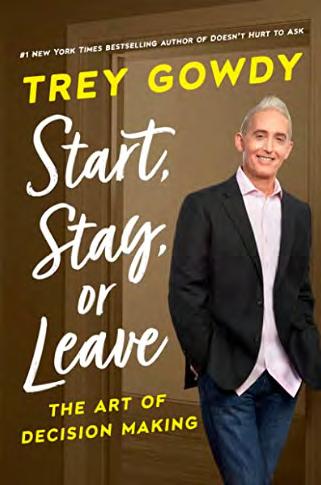
BUSINESS PODCASTS Issue 90 / January 2023 15 / orient-magazine.com
Choose the path that is best for you.
As the only school in Singapore to offer the choice of A Levels or the IB Diploma in Sixth Form, Tanglin Trust School students can thrive and flourish by studying the programme that most suits them; either the specialist study of three to four subjects or a broad and balanced programme of six subjects.
Our students’ examination results are outstanding, consistently surpassing Singapore and global averages, with 95% of graduates typically receiving their first or second choice university, which are among the best in the world. But that’s not the full story.
Going to school is also about developing a community of lifelong learners, whether it be through sports, the arts, outdoor education or the multitude of other opportunities students embrace. With the support of our dedicated and experienced staff, everyone gets a chance to find their passion, to be part of our dynamic community, and to achieve their personal best.
Visit www.tts.edu.sg

CPE Reg. No. 196100114C (7/6/2017 - 6/6/2023)
Inspiring future generations of changemakers.
At Dulwich College (Singapore) we believe in nurturing global citizens and well-rounded future leaders who are equipped to create solutions to the world’s challenges. Our goal is to encourage our students to Live Worldwise – to make informed choices, take inspired action and create positive impact. Our innovative and world-changing education is wellbeing-focused and balances academic excellence with a wealth of co-curricular opportunities that enable our students to discover their individual talents and passions.
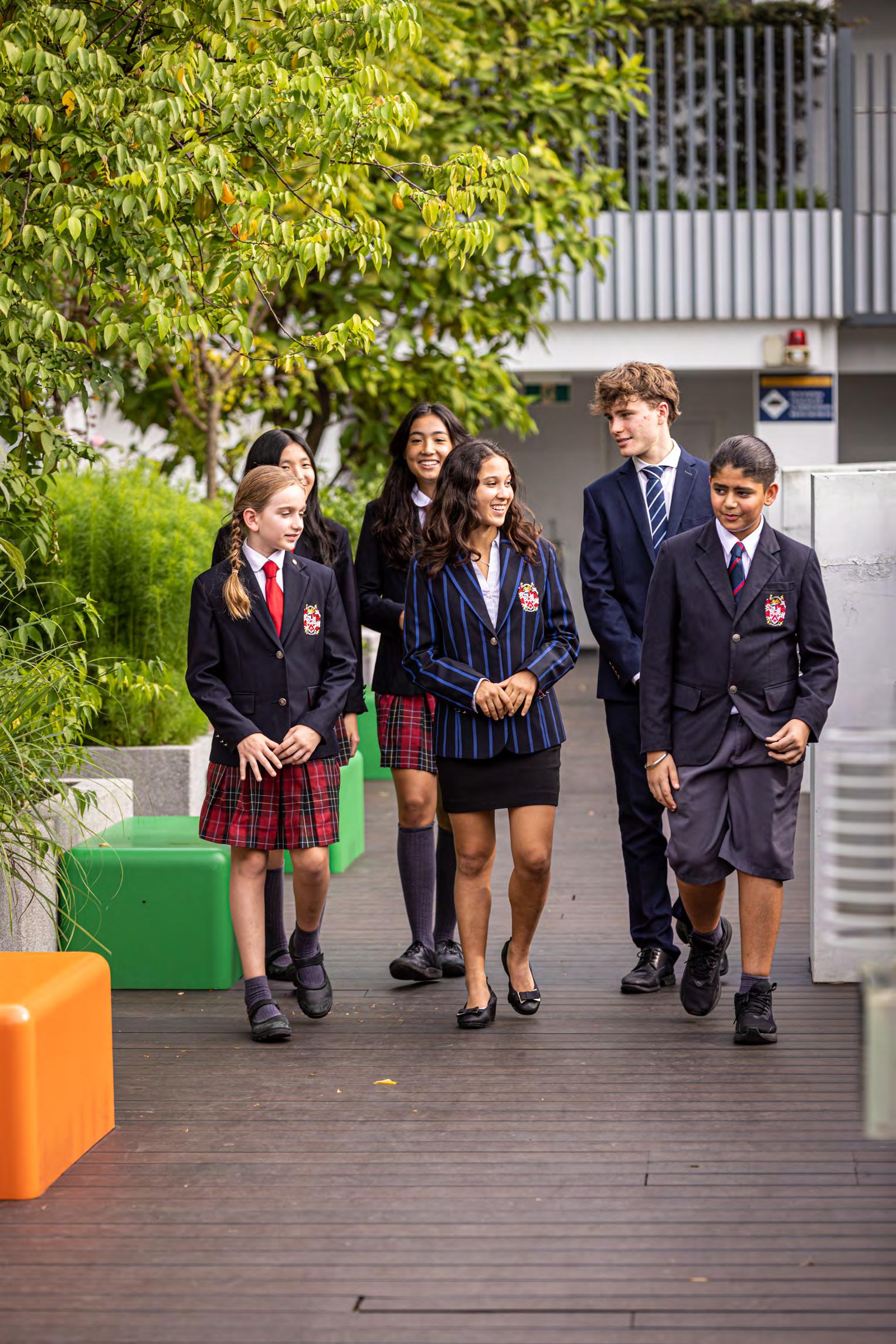
To learn more visit Singapore.dulwich.org or call admissions at 6890 1003



Dulwich College (Singapore) CPE Registration Number: 201027137D. Period of Registration: 09 January 2020 to 08 January 2024. School Location: 71 Bukit Batok West Avenue 8, Singapore, 658966
MEMBER PROFILES / IN FOCUS: NICK ALCHIN, HEAD OF COLLEGE, UWC SOUTH EAST ASIA
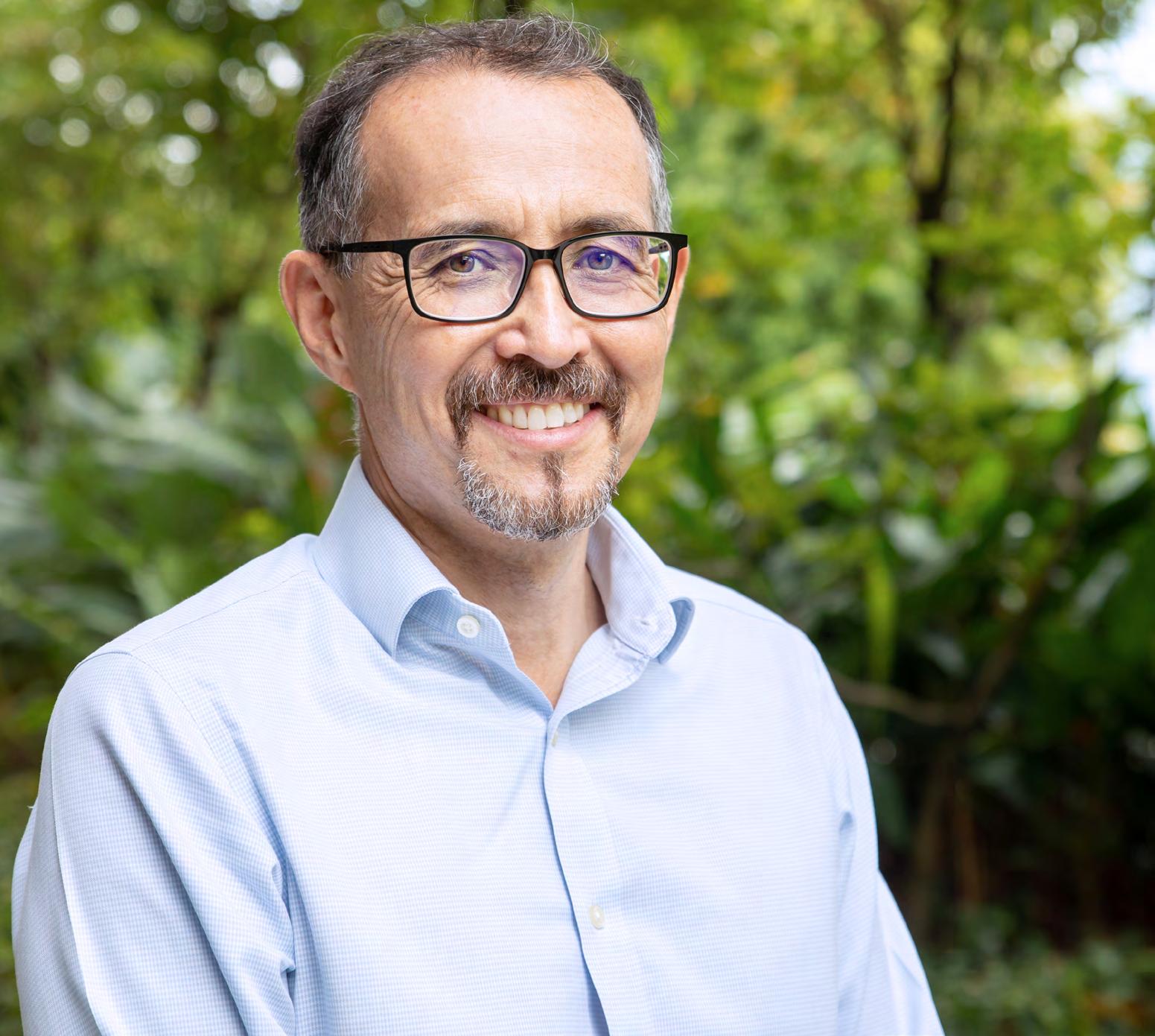
UWC, which operates on two campuses here in Singapore, has a unique mission to educate their students to embrace challenge and take responsibility for shaping a better world. In this interview, the recently appointed Head of College outlines his vision and hopes for the future leaders they educate.
by Lucy Haydon, Editor Photos UWCSEA
Tell us a little about the UWC learning journey. It’s different for every student of course, but the journey is always focused on peace and sustainability. Our mission is to educate individuals to embrace challenge and take responsibility for shaping a better world.
We want every student to make a journey towards that goal, so that they become at peace with themselves as people, able to work with
others from all different backgrounds and able to engage with those with differing views. The challenge is to help them to become adaptable and flexible as adults, without losing their own sense of identity.
They must be able to work in the world, the way the world is, but never to lose sight of the way they want the world to be. Maintaining that sense of optimism while being deeply pragmatic is an important lesson for us to pass along.
You recently stepped into the role of Head of College – what are your hopes and goals for the future?
I would say it’s less about my own personal goals, and more about how I can help move us towards our mission for the future. The extent to which I am successful or not is the extent to which I help move that mission forward. We want to work in partnership with parents, so one aim is to mobilise the community and ensure our families understand what we are striving for, and support decisions about priorities in our plans to reach those goals.
There is always the possibility for more radical rather than incremental change
rather than- for example we have just announced our plans to move away from GCSEs in the future. If there is a different type of education which still delivers those goals, we should be open to considering that as an option.
For example, spending time in countries with those from a different socio-economic background, and making a significant difference over time, aligns well with our mission of service, but this would be difficult when there are GCSE teaching and exam timelines to consider. Opportunities like these could give our students a considerable advantage with new experiences and new perspectives.
How does UWCSEA interact with and support the local community?
In so many different ways with a range of projects! The idea behind all our community programmes is to identify a genuine need which the students can support through service, so that both parties genuinely benefit.
We try to have meaningful interactions with our students so that they engage with people they may otherwise not cross over with. For example, we have
MEMBER PROFILES Issue 90 / January 2023 18 / orient-magazine.com
a group working with the Apex Harmony Lodge, which is a house for people with dementia I have personally been involved with. This has evolved over time into a project aiming to create a Music Therapy healthcare solution that is scalable and accessible, with the potential of reaching dementia patients across Singapore and beyond.
The correlation between dementia patients and music is already established, and our students began looking at which genres of music bring the most positive responses, curating Spotify playlists. Now, they are looking into an AI app to use algorithms to build on this, based on the patients’ responses. These changes are being driven by students aged between 14-18 years, having to consider IP, legal implications, using sensors to monitor neurological reactions…. it’s incredible how much they can achieve through their passion, curiosity and with the right support.
What topics have captured the students’ attention and imagination the most this year? The standout topic would be sustainability, not just in climate change but more broadly, in how we can run our own business practices in the most sustainable way. We can see students’ anxiety about the future, and their passion and interest to make positive change.
A few years ago, we redesigned our uniform, going all the way through our supply chain in evaluation, and the students helped with that project. One of our sister schools has since also adopted the uniform as a result. In another example, we work with our business partners to teach our enterprise classes. How do you look at food waste? How can we measure and operate efficiently in our use of energy? Students can understand through this holistic approach how they can make an impact in a corporate environment.
We have made both of our campuses smart buildings, with sensors and a control center in each. These have been designed to be student-friendly for all ages as a teaching tool, from primary students understanding through basic charts how Singapore’s weather makes a difference to our solar panel output, to older students using the data in their research projects. We can measure water leakages, air quality, energy output, etc., and we have had interest from the Singapore and Malaysian Governments in our approach to facilities management. For our solar panel installation, which is one of the largest in Singapore, out students pitched the concept to our Board and then worked on the physics and practicality of the currents needed to operationalise it.
The second theme would be innovation. We’ve recently built innovation hubs on each campus and have been involved in competitions around Singapore with various projects from sustainability solutions to robotics. Innovation doesn’t just have to be led by technology, but of course it is often connected. It’s about problem-solving, being curious, and seeing the possibilities for changing things for the better, which again leads back to our wider mission.
How do you see the commercial side of our member network working together with the students in the future? Are there key skills and topics which our members could support with? I would love to see increased engagement between the business community and our students, to partner with us outside of the academic curriculum and open students eyes to future careers and experiences. Internships for Grade 10 students and career fairs are opportunities we welcome for the benefit of both sides, as well as welcoming business leaders to speak to the students on topics they are passionate about, or opportunities for students to join the audience at events where they can learn.
About UWCSEA

UWC South East Asia is a united, welcoming community that embraces students and their families from around 100 different nations. The second member of the UWC Movement, the College was opened by Lee Kuan Yew as Singapore International School in 1971. SIS became the United World College of South East Asia in 1975 and has gradually expanded to become the K–12 international school of over 5,600 students across two campuses that it is today. For more information visit uwcsea.edu.sg

“They must be able to work in the world, the way the world is, but never to lose sight of the way they want the world to be.
Maintaining that sense of optimism while being deeply pragmatic is an important lesson for us to pass along.”
UWCSEA Dover Campus
UWCSEA East Campus
IN FOCUS INTERVIEW Issue 90 / January 2023 19 / orient-magazine.com
PROFILES / A DAY IN THE LIFE OF... DANIEL LEUNG, COUNTRY MANAGER, ACCA SINGAPORE
In this edition, Daniel shares his photo log as he hosts Helen Brand, ACCA’s Global Chief Executive, on her visit to Singapore.
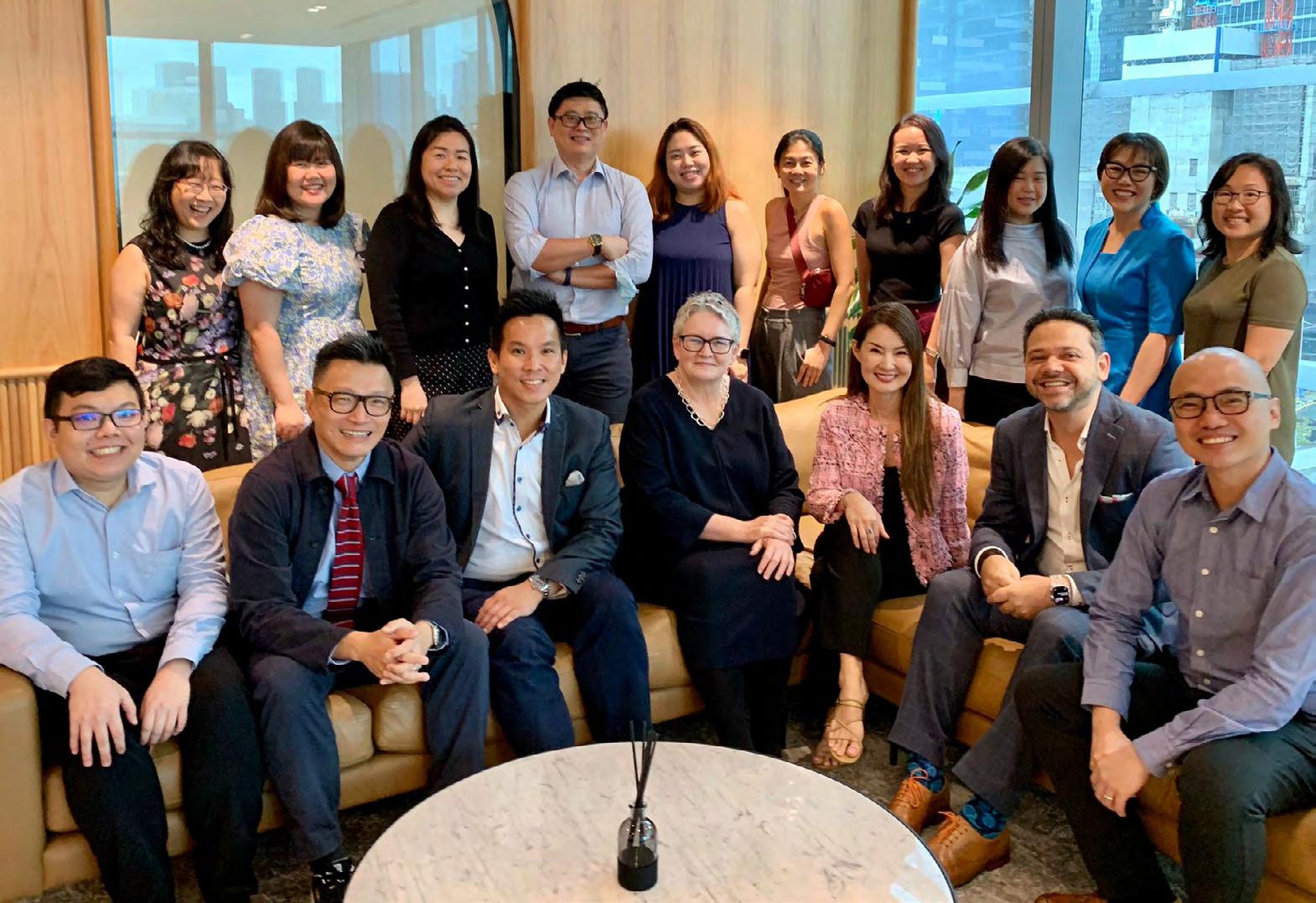
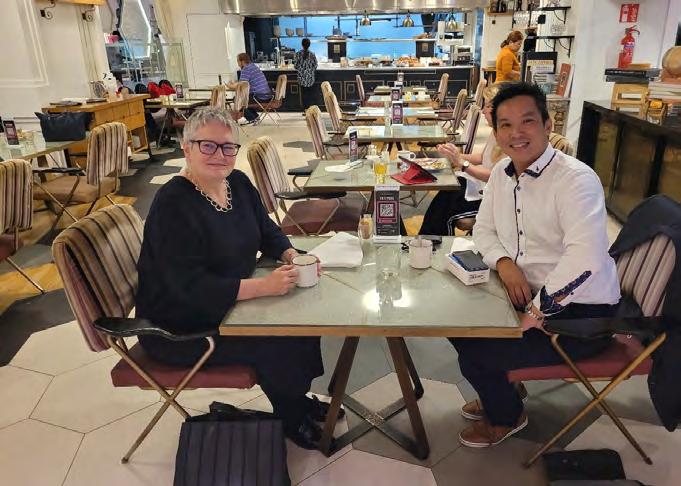

05:30 / Beautiful sunrise
The alarm rings and an unfamiliar melody “Outer Bell” greets me amongst the darkness of the morning sky. I have a sneaky feeling that my toddler was messing with my phone and changed the ringtone. Military service has trained me well to get ready quickly as I left home promptly. Was greeted by this beautiful sunrise over Bukit Timah.
06:45 / Early Start
My first appointment of the day is to meet Helen. She has just arrived in Singapore. Despite her grueling travel schedule, she was still energetic. We managed to squeeze in a quick catchup before her live interview with MoneyFM 89.3.
07:35 / With radio, the listener absorbs everything Helen goes live on MoneyFM 89.3: The Breakfast Huddle radio programme with hosts Elliott Danker & Finance Presenter, Ryan Huang. She shared with their listeners about ACCA and our industry insights about the various sustainability reporting standards and the importance of finding the right framework for your organisation.

08:00 / How would you like your eggs in the morning?
The last time Helen and I met face-toface was in 2016, at the official opening of the new ACCA London Headquarters. I was still an active Deloitte ACCA advocate then! Fast forward 6 years, I am proud to be working for an organisation that I am also a member of. Finally, we were able to sit-down and catch-up over Over-Easy eggs.
09:00 / ACCA
Singapore Staff Townhall
Helen makes it a priority to meet and interact with our hardworking ACCA colleagues on her overseas trips. This trip’s theme was “Ask Me Anything” and she was sporting enough to an-
MEMBER
MEMBER PROFILES Issue 90 / January 2023 20 / orient-magazine.com
ACCA Singapore Staff Townhall
swer questions such as her favourite food and places to visit in Singapore. It’s not just business talk. It was also an opportunity for her get-to-know everyone. Did you know, she has never had the opportunity to visit Sentosa? Something our team have noted it as a to-do for her next trip!


10:30 / Visit to Accounting and Corporate Regulatory Authority (ACRA)

After the townhall, We met with Ong Khiaw Ong, CEO; Kuldip Gill, Assistant CE (Accounting and Compliance Group), Ng Meow Ling, Chief Inspector Practice Monitoring Department, and Kee Wei Wong, Head Accounting Policy Department from the Accounting and Corporate Regulatory Authority (ACRA). They discussed about how ACCA and ACRA can work together to promote Sustainability reporting in Singapore.
1400 – Meeting with the UK Department for International Trade

The next stop was the British High Commission in Singapore. We had a fruitful meeting with the officials from the UK Department for International Trade (DIT). Helen led the discussion on how ACCA could collaborate with the DIT to strengthen our partnership in supporting connectivity and driving sustainability in Southeast Asia. Due to the security reasons, we were not allowed to bring our phones and electronic devices to the venue. I wish I could take more pictures for you to see, and for my son who is always curious about what I do outside of home.
18:00 / ASEAN+3 Macroeconomic Research Office (AMRO) Meeting
As the evening sets in, we made our way to dinner. Dr Kouqing Li, Director, ASEAN+3 Macroeconomic Research Office (AMRO), a friend of ACCA, has organised for Helen, Hiroto Uehara, Deputy Director General for Asian Affairs, Bank of Japan, other guests and I. We had a scrumptious Teochew dinner and discussed collaboration opportunities in areas related to research and advocacy. One of the best Teochew Cuisine I have tried in Singapore and nestled in this heritage building.
16:00 / Ministry of Finance, Singapore Meeting
12:00 / FutureCFO Conference
Helen had an intellectual exchange at the FutureCFO Conference as she spoke at the panel that discussed about how the finance function can play a central role in driving the ESG agenda. Well, it was more than just an intellectual exchange. Many ACCA members who attended the conference were also eager for a picture opportunity with Helen. Truly TEAM ACCA
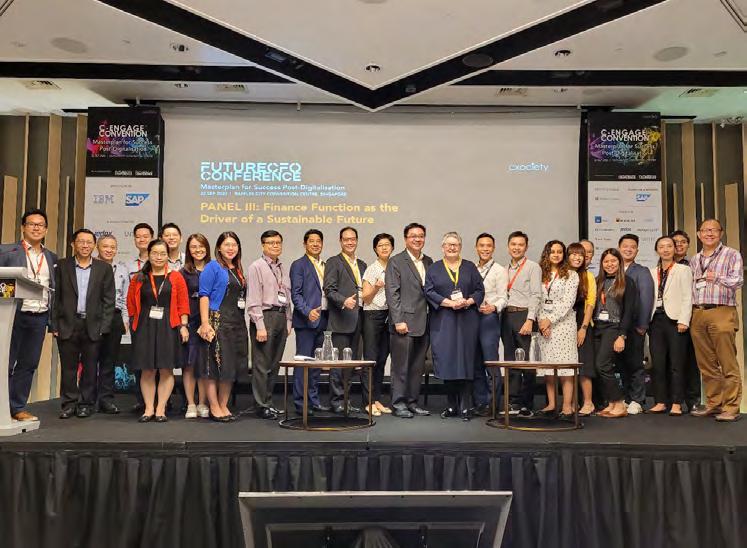
By this time, we were two stops away from our last meeting agenda. We met with Minister Indranee Rajah, Second Minister for Finance & National Development at the Ministry of Finance (MOF), and Evan Law, Chief Executive of Singapore Accountancy Commission. We shared the role that ACCA Singapore can play a part towards Singapore’s vision to be a global accountancy hub. This was also my first ever visit to the MOF office!
23:00 / Home Sweet Home
Despite previous experience where slight noises will wake up my toddler, I couldn’t resist stealing a peek at his peaceful sleeping posture. Slight murmur and I am out of his room in ultra fast speed!
About ACCA
ACCA (the Association of Chartered Certified Accountants) is the global body for professional accountants. We’re a thriving global community of 241,000 members and 542,000 future members based in 178 countries and regions, who work across a wide range of sectors and industries. We uphold the highest professional and ethical values. We offer everyone everywhere the opportunity to experience a rewarding career in accountancy, finance and management. Our qualifications and learning opportunities develop strategic business leaders, forward-thinking professionals with the financial, business and digital expertise essential for the creation of sustainable organisations and flourishing societies.good has been embedded in our purpose. Visit accaglobal.com
A DAY IN LIFE OF OUR MEMBERS Issue 90 / January 2023 21 / orient-magazine.com
06:53 / Rise and shine
I wake up 2 minutes before my alarm is scheduled to go off. That’s good news for my wife, Irina, who is still asleep. I quickly scan the news headlines and check for any WhatsApp messages, but work emails can wait until I am in the office. Most mornings, I will skim through the day’s online edition of The Times and do the quick cryptic crossword to help warm up my brain for the day. But not today, as I have (for me) an early start.
08:05
/ Golf lesson
After a quick breakfast of cereal and a fruit smoothie, it is time to head out. I rarely leave home this early, but today
I start the day with an indoor golf lesson at Golftec in Republic Plaza. I suppose it is rather a cliché for a partner in a law firm to play golf, but I am fascinated by the process of trying to develop a decent swing. For me it is an intellectual challenge that appeals to my analytical character. Cryptic crosswords are much, much easier…

THE LIFE OF... JOHN FORRESTER, MANAGING PARTNER, HFW SINGAPORE LLP
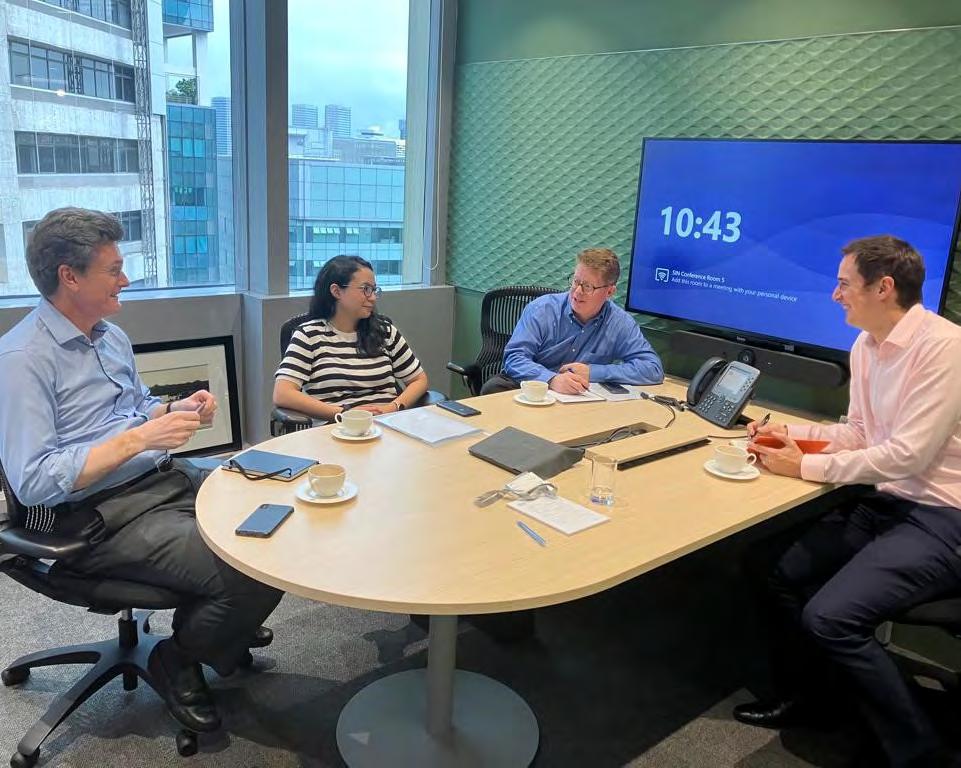
09:45 / Meeting with Rocktree Logistics
09:40 / Office time
I arrive at the office and find myself a desk for the day. We moved to new premises (30 Raffles Place) in March 2022 and now operate a policy of hot-desking for all staff. Today I choose to sit with my shipping group colleagues in an open plan area affectionately known as the “Mosh Pit”. Having partners, associates, trainees and secretaries all sitting together creates a real buzz and leads to so much more interaction. I strongly recommend it.
The working day begins with a meeting with our good clients, Rocktree Logistics. We discuss some existing matters and are also told about a new deal. Good news! It is then back to today’s desk to go through my emails, deal with some KYC issues relating to a new client and update various draft contracts. I work as a shipping lawyer, mainly on the financing and contract side, so my client work is almost always to do with ships (which I love). I also have a catch-up with my wonderful office manager, Laarni. Our Singapore office has over 60 staff (with 40 lawyers) so it is a sizeable operation to run and I rely heavily on Laarni and her team.
MEMBER PROFILES /
A DAY IN
MEMBER PROFILES Issue 90 / January 2023 22 / orient-magazine.com
John and fellow HFW Partner Adam Richardson, with their client Rocktree Logistics
14:00 / Working lunch
After working all morning – punctuated only by a brief coffee run (above) – I head out to buy some pasta and a yoghurt to bring back to the office for lunch. I do try to avoid eating at my desk, but today it is a working lunch at my laptop in one of our break-out areas, before setting up again in the Mosh Pit.
17:45 / Media interview with the South China Morning Post
I have an interview with The South China Morning Post who want to hear my views about the opportunities and challenges facing our firm in Singapore.
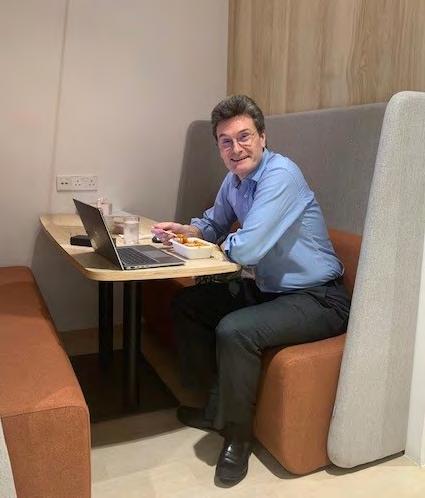
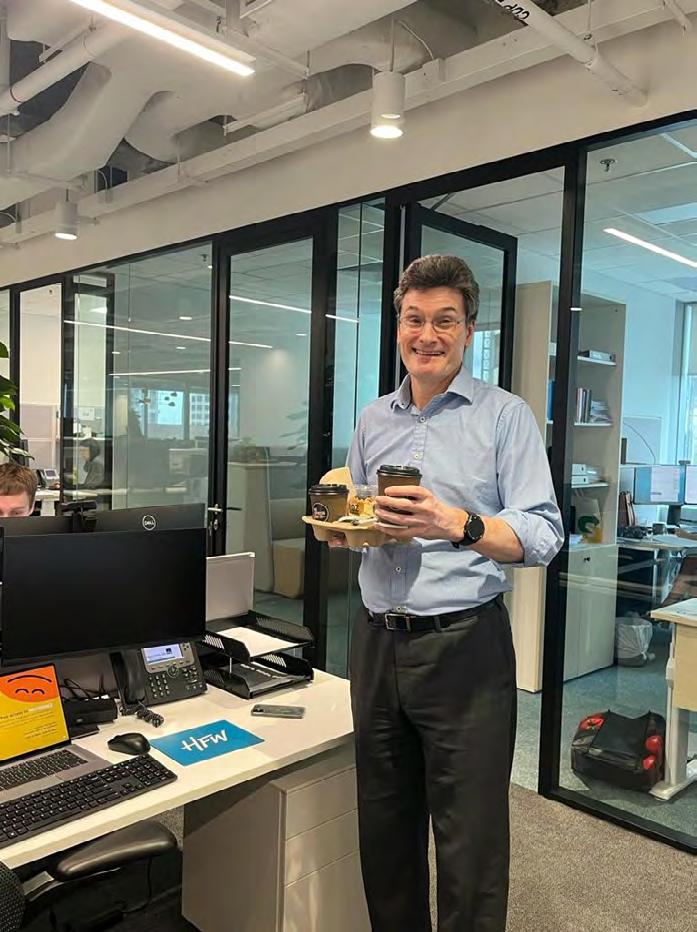
19:05 / Teamwork
My wife calls to check when I’ll be home. I say “soon”. And then almost immediately a colleague asks for some help on something urgent. This is normal.
20:25 / Family time
21:50 / Evening run
I go out for an 8k street run. I used to run much more in the UK and loved running long distances, but I find it harder here. I actually don’t mind the heat and humidity in Singapore, but it just takes so long to cool down afterwards. Why does my condo have a sauna but not an ice room?

16:20 / Afternoon snack time
I snack on an apple and have a cup of “builder’s” tea. This is my last food for the day as I try to eat only between 8:00am and 5:00pm. I will break this rule for client dinners and special occasions, but it helps me keep off the weight and feel fit and healthy.

I leave the office and get home an hour or so later than promised. My wife is used to this and accepts that I am, in her words, “reliably unreliable”. Another cliché for this lawyer, to go alongside playing golf. After chatting with my wife and checking out a painting she has just finished (she is an artist), I chill out for a bit watching golf and music videos on YouTube. I also have a brief word with my youngest son, Dmitri, who is busy studying for his IB at Dulwich College (Singapore). His elder brother, Nikita, is away at university in Milan. Lucky chap.
00:24 / Lights out
After cooling down and taking a shower, it’s lights out and time for sleep. I usually fall asleep listening to a podcast. This evening I choose an old episode of The Bugle. I don’t suppose it is to everyone’s taste, but it is my all-time favourite. I was even name checked in it once (Episode 4121) in an item about an ambitious goldfish. I shall say no more!
About HFW
HFW is a leading global law firm in the aerospace, commodities, construction, energy, insurance, and shipping sectors. The firm has more than 600 lawyers, including 185 partners, based in offices across the Americas, Europe, the Middle East and Asia Pacific. HFW prides itself on its deep industry expertise and its entrepreneurial, creative and collaborative culture. Find out more hfw.com
A DAY IN LIFE OF OUR MEMBERS Issue 90 / January 2023 23 / orient-magazine.com
“Having partners, associates, trainees and secretaries all sitting together creates a real buzz and leads to so much more interaction. I strongly recommend it.”

In an uncertain world, those who embrace change will be those that flourish. When young people are empowered to question their world, they are inspired to improve. Discover how 175 years of British heritage has made us a school of future shapers. Brighton College (Singapore). One of a Kind. A legacy of learning. Reinvented for today. a d missio n s@brig h t o nc o lle g e.e d u.s g b r i g ht o n c olle g e e d u s g + 65 6 505 97 9 0 Virtual Open House on 9 February 2023 Register at brightoncollege.edu.sg/openhouse-registration B r ig h ton Coll e g e ( Singapo re ) Pt e Ltd C PE R e g i st ration N umb er : 2 0 1 9 04884D Per iod of R e g i st rat i on: 14 Octob e r 2 0 1 9 to 1 3 Octob e r 2 0 2 3
TURNING BOLD PROMISES INTO CONCRETE PROGESS: REFLECTING ON THE UK’S COP PRESIDENCY
The UK’s Regional Director for Southeast Asia on Climate and Energy, Tom Moody, reflects on the progress made since COP26 and the regional opportunities.
COP27 in Sharm El-Sheik in November 2022 marked the end of the UK’s COP Presidency. We held global leadership of climate ambition for an unprecedented three years, over a period in which the world faced similarly unprecedented challenges.
The need to tackle the climate emergency has become notably more urgent. Scientists have warned that we are approaching the point of no return, and the planet itself echoed that alarm, from Australian wildfires to devastating floods in Pakistan.
We have battled a common COVID threat, and as economic activity declined, we glimpsed a shared future that convinced people of the benefit of collective ambition.
Key technologies that will power the transition have matured and become affordable: solar power has become the cheapest form of energy in history, battery costs have fallen 85% in the last decade, and in the UK, our latest auctions have achieved record low prices for offshore wind.
Our COP26 Presidency held this sense of momentous risk and opportunity as we convened the largest diplomatic event on UK soil since the Second World War. And most of those I’ve spoken to since, in the UK and around this region, would agree that the UK delivered. During our Presidency, SE Asian countries responsible for about 85% of greenhouse gas emissions committed to phasing them out entirely by mid-century.
Globally, the Glasgow Climate Pact represents one of the most significant increases in climate ambition since the Paris Agreement: a full 1c fall in projected temperatures by 2100 if those commitments are fully implemented.
Recognising that crucial final point, we have focused our Presidency on turning bold promises into concrete progress. With support from Singapore and Norway, Glasgow resolved the technical barriers to carbon trading between countries which will unlock faster and more accountable flows of money towards faster decarbonisation and restoration of nature. We used our coincident G7 Presidency to launch a new way for the UK and other major donors like the US, EU, and Japan to build major climate finance packages for countries that need the most help to cut big emissions. Called Just Energy Transition Partnerships, they will help the biggest fossil fuel users like South Africa, Indonesia and Vietnam. The Prime Minister also announced a trebling of UK spending on adaptation to climate change by 2025.
Russia’s illegal invasion of Ukraine has put huge economic stress on many countries as they emerge from the pandemic. But it has also made the relative cost of clean energy more competitive, and articulated an even clearer security rationale for freeing ourselves from fossil fuels. As a result, their use will peak earlier – in 2025 –before beginning their final decline.
I’m proud of what the UK has achieved over such an important period of human history, keeping a liveable future alive. But we are not complacent, and that brighter future remains – as our COP26 President Alok Sharma put it – “on life support”. Our work with Singapore to build the UK’s first Green Economy Framework Agreement is a sign of how important green growth will be to our most important bilateral relationships. And as ASEAN countries emphasised when we became their newest Dialogue Partner last year, there is much we can and should do to continue our COP26 legacy through our closer relationship with this vital region.
About the author
Tom Moody oversees the UK Government’s climate change and energy strategy in the ASEAN region, and mobilisation of regional policy, development programming, and commercial work to deliver it. This includes directing the UK’s unique network of climate change and policy attaches across SE Asia, who carry out policy advisory and engagement to raise ambition across the region. His career prior to this included overseeing HMG’s £50m portfolio of Prosperity Fund programmes of technical assistance in the South Africa region, the UK Overseas Territories, as well as domestic policy on education, justice, and police accountability.
COMMENTARY
/
COMMENTARY Issue 90 / January 2023 25 /orient-magazine.com
ISSUES / BUNKERS, DATA & ALL THE BIG STUFF
The “uber risks” that businesses in Southeast Asia will run up against in 2023 should be manageable. But mind the (compliance) gaps.
by Steve Wilford Partner, Control Risks
“We even hold these meetings in a windowless room – makes it feel more like a wartime bunker.
I think this particular regional head of government relations was joking about the meeting space for her company’s risk committee, but after a 2022 of actual conflict in central Europe having real implications for corporate strategy, and much (off the mark) talk of possible clashes in the Taiwan Strait blowing up regional supply chains, it’s unsurprising that some executives in their darker moments feel like they are on a war footing. After all, they can no longer just fret about a possible truck driver strike in Bangkok or an off-piste regulator in Jakarta; boards, CEOs, risk committees, and strategy teams must now take in the “big stuff”.
You know what that is: the global economic slowdown that’s going to define our 2023; the US-China decoupling that will motor on for years to come; the inevitable North Korean nuclear test just when you’ve got over your Taiwan Strait angst; and yes, sadly, fighting in central Europe that has yet to reach its high-water mark.
But my advice for managers in ASEAN is to go light on the bunker mentality in 2023. This so-called “polycrisis”, an interlocking hellscape of disparate but inextricable geopolitical risks, is rather overrated for those of us trying to do business in Southeast Asia.
“Interesting, frightening, certainly worth monitoring, but not really feeling it directly” was the overall sense at a recent roundtable of Singapore-based CEOs, legal counsel, and production managers to the geopolitical risks outlined above. Indeed, the view from Singapore, KL, Jakarta,
Manila, Bangkok and Hanoi is rather bright. In these capitals, current account deficits are under control, inflation is lower than it was in the wake of the 2008 global meltdown, levels of corporate debt remain manageable, and much of it is locally denominated. The momentum and quality of ASEAN’s surge out of COVID-19 will carry it some way forward next year even as demand tanks elsewhere. Relatively speaking, as China staggers towards the COVID off-ramp, as Europe fights and freezes, as the US inflates itself into an induced recession, consumption and GDP growth in much of Southeast Asia is going to remain robust.

GLOBAL
GLOBAL ISSUES Issue 90 / January 2023 26 / orient-magazine.com
The region’s politics won’t exactly add to this relative-good news story in 2023, but they won’t particularly detract from it either. If a “clique” might be defined as the machinations of sub-party groupings, 2023 will be its year. Cliques within Malaysia’s UMNO will be kingmakers in the new normal of that country’s highly fractured politics – Prime Minister Anwar Ibrahim’s twenty-plus-year dream of power might be short-lived. But business will roll on – just don’t try and book an appointment with a minister.
Cliques around Prayut Chan-o-cha’s junta-backed government in Thailand will have the deciding vote rather than the general public in polls scheduled for next year. And yet “Teflon Thailand” will be one of the few economies to grow year-on-year, perhaps a respectable 3.6% as it reclaims its role as a tourism and agriculture superpower. In the Philippines, Bong Bong Marcos is busy reminding us that there, “clique” is a synonym for “family”. He’s formed an unholy trifecta between his clan and those of preceding presidents Duterte and Macapagal Arroyo, but again, in the context of a relatively light-touch government.
Cliques in Indonesia’s most powerful political party, the PDI-P, may put a brake on the emergence of any meaningful candidate to challenge Prabowo Subianto in the 2024 presidential contest already well underway. He shares a love of Mussolini with Italy’s Prime Minister Giorgia Meloni, but unlike the election that produced her, Indonesia’s poll will be a relative paragon of decorum and continuity. “Never easy, but still attractive” will be the mantra that continues to guide investors in Indonesia.
But perhaps the prize for cliquishness goes to the Vietnamese Communist Party, where members of various interest groups vie for senior politburo posts using exposés and corruption probes to undermine each other. This will pick up pace next year until a successor for party General Secretary Nguyễn Phú Tr ng emerges, but regardless, Vietnam – the darling of the foreign investment community in 2022 – will claim that position again in 2023 not because it is “Little China” but because it actually puts together the red carpet for foreign investors really rather well.
But before we relax, in Southeast Asia there are parts of the polycrisis where we won’t merely be spectators, but active and successful participants if we prepare, or just victims if we don’t.
Let’s take cyberspace. Companies in Southeast Asia are acclimatising to the discomfort caused by the mishmash of cyber security and data privacy regulation that has emerged around the region in the last few years. All of it annoyingly different, all of it annoyingly similar in its desire to assert “digital sovereignty”. Indonesia wants you to bring Indonesian data home. Thailand wants you to police what you host a lot more carefully. Vietnam wants you to think you are in Chinese cyberspace, but Hanoi doesn’t quite have the gall or domestic champions to pull it off – so it’s a fudge.
The resulting difficulty in doing digital business across these regimes and between them and major markets elsewhere will be the cause of legal and reputational headaches for years to come. That’s the good news. The bad news is, as companies in Asia harvest vast amounts of data and then store it locally, it will undermine the very digital sovereignty that these governments crave because that data will – not may – get hacked, held to ransom and published. The blame for this will be placed on the firm. In 2023, there will be stories of governments commandeering the systems of firms that fail to respond effectively to a cyber breach. There will be high-profile punitive enforcement as governments give up on the carrot and start to use the stick, especially in the realm of “data minimisation”. Businesses should devote a lot of time and resources to defending their data and pre-emptively assessing the reputational and legal risks of holding so much of it.
This year saw the public lexicon shift from “climate emergency” to “climate disaster” (just have a look at Twitter). The next year will see the corporate phrase “climate change commitment” morph into “climate change compliance”. That one-word revision is profound: it represents the shift from companies seeing decarbonising as a nice-to-
have to a must-have, an obligation to fulfil – otherwise go out of business and/or go to jail.
Take the freshly finalised EU Carbon Border Adjustment Mechanism (CBAM). When this comes into force in 2026, you will have to add up and then pay for the carbon you produce on your exports into Europe. This will start in dirty industries, but I guarantee you it won’t stay there. The misleadingly named US Inflation Reduction Act (IRA) is in effect a massive subsidy to the US green economy and will amount to a similar wall to carbon-intensive competitors over time. The need for US and EU firms to demand decarbonisation from their suppliers in Southeast Asia will become a legal requirement, not just a moral option. Unlike the machinations of Kim Jong-un or Vladimir Putin, this challenge is highly predictable and is one that can be used to create value if responded to decisively.
And so, it should be comforting to know that the most important “uber risks” that could smash into the sides of Southeast Asian businesses in 2023/4/5 are ones that, mitigated properly, will add to the sum total of global good corporate governance. Not a bad place to be, and certainly better than a wartime bunker. Happy New Year.
This article was originally published in The Business Times on 30 December 2022
About the company
Control Risks is a global specialist risk consultancy committed to helping our clients build organisations that are secure, compliant and resilient in an age of ever-changing risk and connectivity. We believe that responsible risk taking is at the core of our clients’ success. We have unparalleled experience in helping clients solve the challenges and crises that arise in any ambitious organisation seeking to convert risk into opportunity globally. The insight and depth of experience we have gained over more than forty years proves invaluable in giving our clients the intelligence they need to grasp opportunities with greater certainty. Visit www.controlrisks.com
BUNKERS, DATA AND ALL THE BIG STUFF Issue 90 / January 2023 27 / orient-magazine.com
GLOBAL ISSUES / TIME TO RETHINK YOUR SUPPLY CHAIN

Companies that saw their supply chains crippled by disruptions over the past two years would agree that there’s no better time than now to build one that is stronger, smarter and more resilient. Here’s why and how.
by Atul Chandna Asia-Pacific Supply Chain Leader, EY
GLOBAL ISSUES
Before the pandemic, global supply chains ticked many boxes: lower labour and operating costs, wider product ranges and greater reach to new markets. When the pandemic struck, it didn’t just cause unprecedented supply chain disruption, it also highlighted the fragility and inherent inefficiencies of traditional supply chains.
According to the new EY whitepaper, Supply chain reinvention: what you need to start and stop now, the old models of just-in-time planning, siloed teams and business-to-business blinkers are neither fit for now, nor fit for purpose anymore.
Today, labour and energy costs have risen sharply, as have the costs of raw materials and freight rates. Trade flows are being redefined by foreign policies and tax regimes. Customer expectations are fast changing against increasing emphasis on sustainability and corporate citizenship.
These global developments will impact supply chains. What are the new parameters that are redefining a future-ready supply chain and how can business leaders act on them?
Emergence of reimagined supply chain
Over the last two years, companies have started to review their supply chain, focusing on four areas: shorter and localised supply chains; multiple sources of supply; omnichannel connections with customers; and market clusters.
The benefits are numerous. For example, in a localised supply chain, companies shift from a stock-keeping model to one that’s made-to-order, which can reduce working capital and simplify the sales, operations planning and forecasting process. Multiple sources of supply also help companies better manage excess capacity and volume redundancy while reducing global trade complexity and compliance burden.
With changing customer expectations, having omnichannel connections with customers has become part of the customer engagement process as many manufacturers transition from a largely business-to-business (B2B) model to one that also conducts business-to-consumer (B2C) transactions. Leveraging market clusters i.e., where local demand is met by production within the market or cluster, affords proximity to market and potentially eliminates the need for a regional planning centre.
Harness technology for transparency
When reimagining the supply chain to build resilience, fundamental shifts from traditional supply chain operating models will be needed. For example, managing shorter and localised supply chains require more technology-enabled and analytics-driven capabilities. Multiple sources of supply will require networks to be reconfigured. In omnichannel connections with customers, companies must realise that just a 5% shift to a B2C base can impact demands for planning, warehousing and packaging, and so on.
Many companies are turning to supply chain control towers, where a connected and customised dashboard of data, business metrics and even events, allows businesses to understand, prioritise and address critical issues in real-time.
These control towers support collaboration across teams and provide end-to end visibility across the entire supply chain by tapping on advanced technologies such as artificial intelligence (AI) to break down data silos, run scenarios and deliver real-time actionable insights. Through this, companies can foresee and act on unplanned events before they become major disruptions.
Sustainability risks and opportunities
The pandemic arguably turned a stronger spotlight on sustainability, which was already a growing concern for businesses and consumers.
The EY Future Consumer Index in February 2022 found that 25% of consumers globally were shopping with a “Planet first” mindset, up from 18% who were doing so in May 2021. As well, the EY 2022 CEO Outlook Survey found that CEOs in Asia-Pacific ranked sustainability as the second-most critical risk to their future growth strategies. Nearly three-quarters of the Asia-Pacific respondents cited environmental, social and governance (ESG) as an important driver of value over the next few years.
How can companies ensure their supply chain is aligned with their sustainability goals? Technology is a key enabler. Through digital tracking, businesses can identify emission-reducing opportunities and proactively flag other potential sustainability issues.
Smart companies are using sustainability drivers to rethink their supplier relationships. The old model where supplier relationships are negotiated on low cost and immediacy of supply is making way for one based on mutual benefit, sustainability, traceability and trust.
“When the pandemic struck, it didn’t just cause unprecedented supply chain disruption. It also highlighted the fragility and inherent inefficiencies of traditional supply chains.”
TIME TO RETHINK YOUR SUPPLY CHAIN Issue 90 / January 2023 29 / orient-magazine.com
Talent at the core
At the heart of a strong supply chain is talent. Supply chain teams, once considered a commodity in the value chain, stepped up to deliver results during the pandemic, drawing attention to the importance and value of a strong supply chain talent pool.
The skillsets needed for supply chain management are evolving to include those related to critical planning, manufacturing, data science, artificial intelligence, machine learning, and more. Talent with these skillsets is scarce. Hence, companies must reassess their talent acquisition, development and retention strategies to compete for top supply chain talent. These strategies should include extensive retraining and cross-training, in addition to investments in technology.
Talent with the necessary skillsets can leverage the power of technology – to complement, supplement and support them. Autonomous decision-making can be key to building a resilient and agile supply, and the key question perhaps is how to harness the optimal mix of human and machine.
Consider tax implications early
Shifting the supply chain from global to regional or local can have important tax implications.
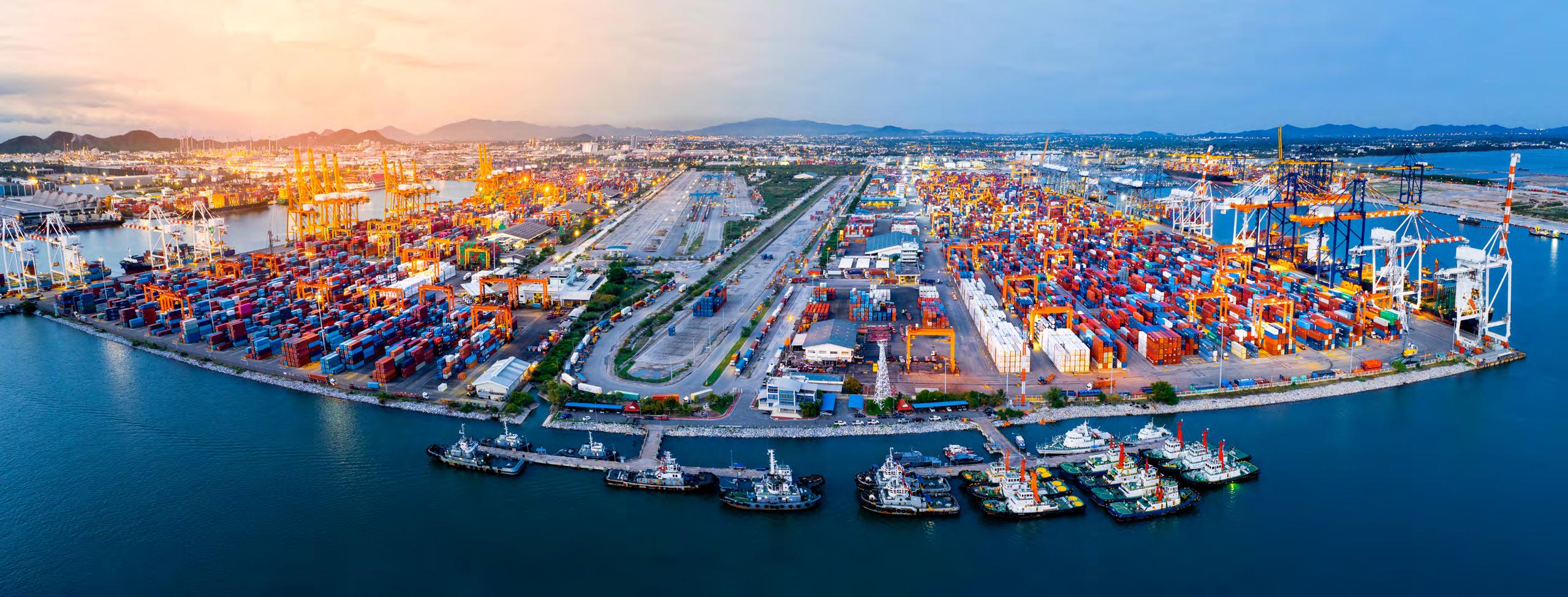
Previously, companies ran regional supply chain hubs that acted as strategic command centers. From a tax perspective, such arrangements generally entitled the organizations to lower taxes, and encouraged businesses to establish hubs in operationally and tax-attractive locations.
With fragmentation and localization of supply chains, companies may be required to revisit their international tax structures as legal entities and tax treatments change. Transfer pricing, in particular, must be re-examined. Other considerations include how profits are split i.e., how is the distribution of these profits achieved without undue tax leakage in the form of withholding taxes, GST or VAT?
Answering these questions and allocating profit requires a detailed analysis of the underlying value drivers and contributions of all levels of the supply chain. Technology also introduces new value drivers that must
be quantified and reflected in the transfer pricing design.
Supply chains fit for the future are founded on end-to-end interconnectivity that will deliver visibility and build resilience. The big question for every organization is: am I taking the right steps to bring that visibility, build that resilience, and ultimately reinvent my supply chain?
The views reflected in this article are the views of the author and do not necessarily reflect the views of the global EY organization or its member firms.
About the company
EY exists to build a better working world, helping to create long-term value for clients, people and society and build trust in the capital markets. Enabled by data and technology, diverse EY teams in over 150 countries provide trust through assurance and help clients grow, transform and operate. Working across assurance, consulting, law, strategy, tax and transactions, EY teams ask better questions to find new answers for the complex issues facing our world today. EY refers to the global organization, and may refer to one or more, of the member firms of Ernst & Young Global Limited, each of which is a separate legal entity. Ernst & Young Global Limited, a UK company limited by guarantee, does not provide services to clients. Information about how EY collects and uses personal data and a description of the rights individuals have under data protection legislation are available via ey.com/privacy. EY member firms do not practice law where prohibited by local laws. For more information about our organization, please visit ey.com
GLOBAL ISSUES Issue 90 / January 2023 30 / orient-magazine.com
/ ASIA SITS ON FRONTLINE OF GLOBAL RISE IN MODERN SLAVERY
Asian countries are among those that have seen the biggest rises in modern slavery in recent years. Identifying where, why and how your business might be affected is a priority in the face of more stringent human rights legislation.
by Dr James Sinclair Director of Human Rights, Verisk Maplecroft
Forced labour, human trafficking and other constituent elements of modern slavery are continuing to rise at a global level. The latest version of our annual Modern Slavery Index (MSI) reveals that a quarter of countries have witnessed a significant increase in modern slavery risk since the dataset launched in 2016. With the issue steadily climbing up the regulatory agenda, understanding how, why and where it can arise has never been so important.
From a supply chain perspective, some of Asia’s manufacturing hotspots have witnessed significant increases in modern slavery risks. These include Vietnam, which is now the 22nd riskiest country in our index (up from 76th). Myanmar is 10th (up from 34th), Cambodia is 25th (up from 61st) and Bangladesh is 27th (up from 43rd).
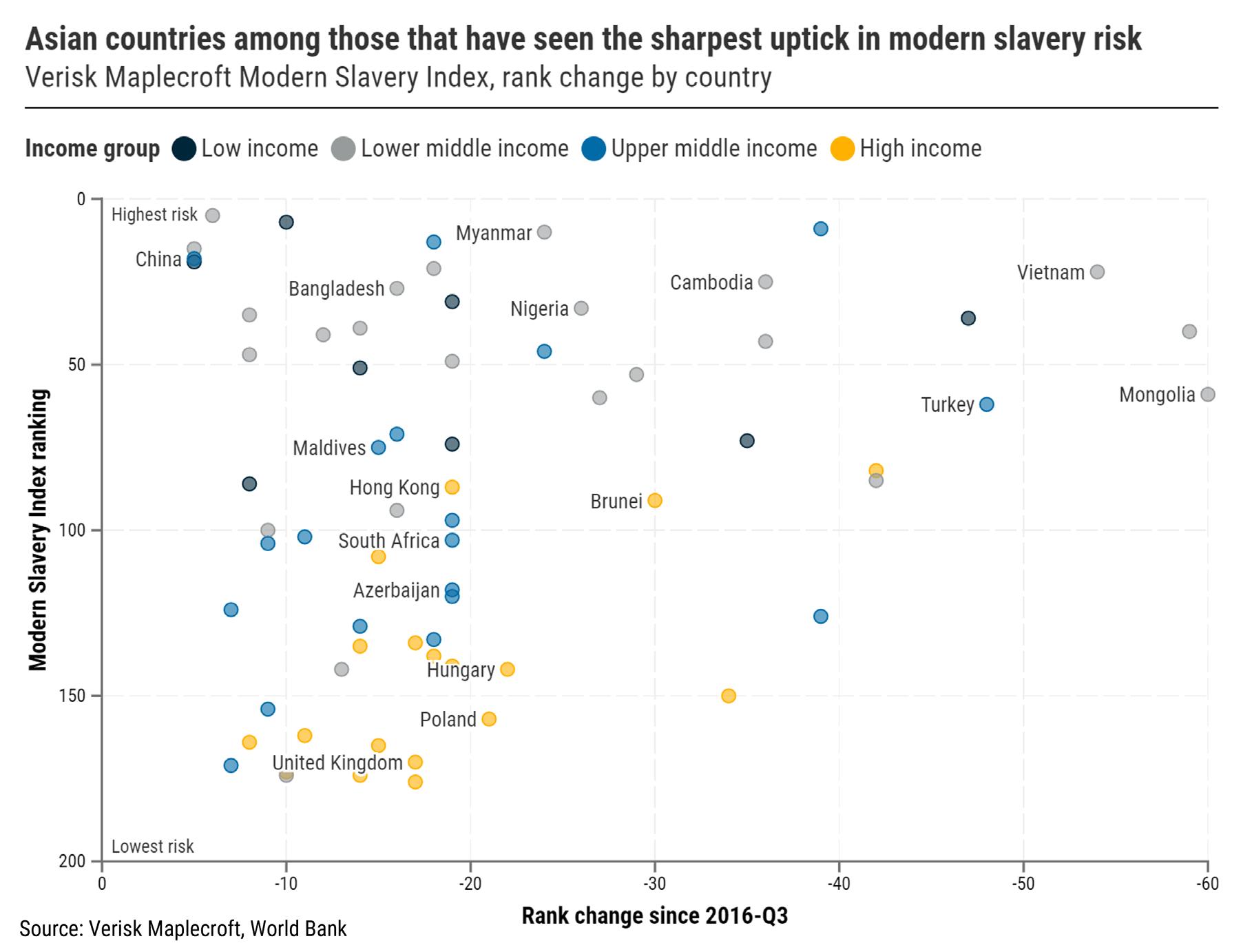
The European Commission’s newly unveiled plan to ban products made
with forced labour from entering the EU market is the latest in a growing list of human rights due diligence laws. When it comes into force, the ban will join the United States’ UFLPA in attempting to eradicate forced labour from global supply chains. Our findings show that doing so will be no easy task.
Regulators, investors, shareholders and consumers have started to become aware of modern slavery risks
GLOBAL ISSUES
ASIA SITS ON THE FRONTLINE IN MODERN SLAVERY Issue 90 / January 2023 31 / orient-magazine.com
that have been evident to human rights experts for years. However, the problem is getting worse rather than better and organisations need to work harder to keep goods tainted by forced labour out of their supply chain.
Zooming in to the subnational level shows the extent of the issue. Our data reveals that two thirds of the world’s 3,316 states, provinces and other subregions are rated as high or extreme risk for modern slavery violations. These are home to 80% of the global population, some 6.25 billion people.
Chinese human rights abuses not limited to Xinjiang
China is by far the largest sourcing country rated extreme risk in the latest edition of the MSI. This should come as no surprise, given that reports of human rights violations in Xinjiang are widespread. Indeed, the UFLPA effectively bans the importation into the US of goods made wholly or in part within Xinjiang. However, China’s commanding position within several industries means eradicating its abuses from global supply chains is easier said than done. This includes renewable energy, where China controls around 80% of the solar photovoltaic manufacturing supply chain, with 45% of the world’s polysilicon capacity located in Xinjiang.
However, the focus on Xinjiang should not obscure the challenges in other Chinese regions. Yunnan, a production hub for tin and zinc, and Tibet are both rated extreme risk for modern slavery within our subnational data, and the rest of the country is rated high risk.
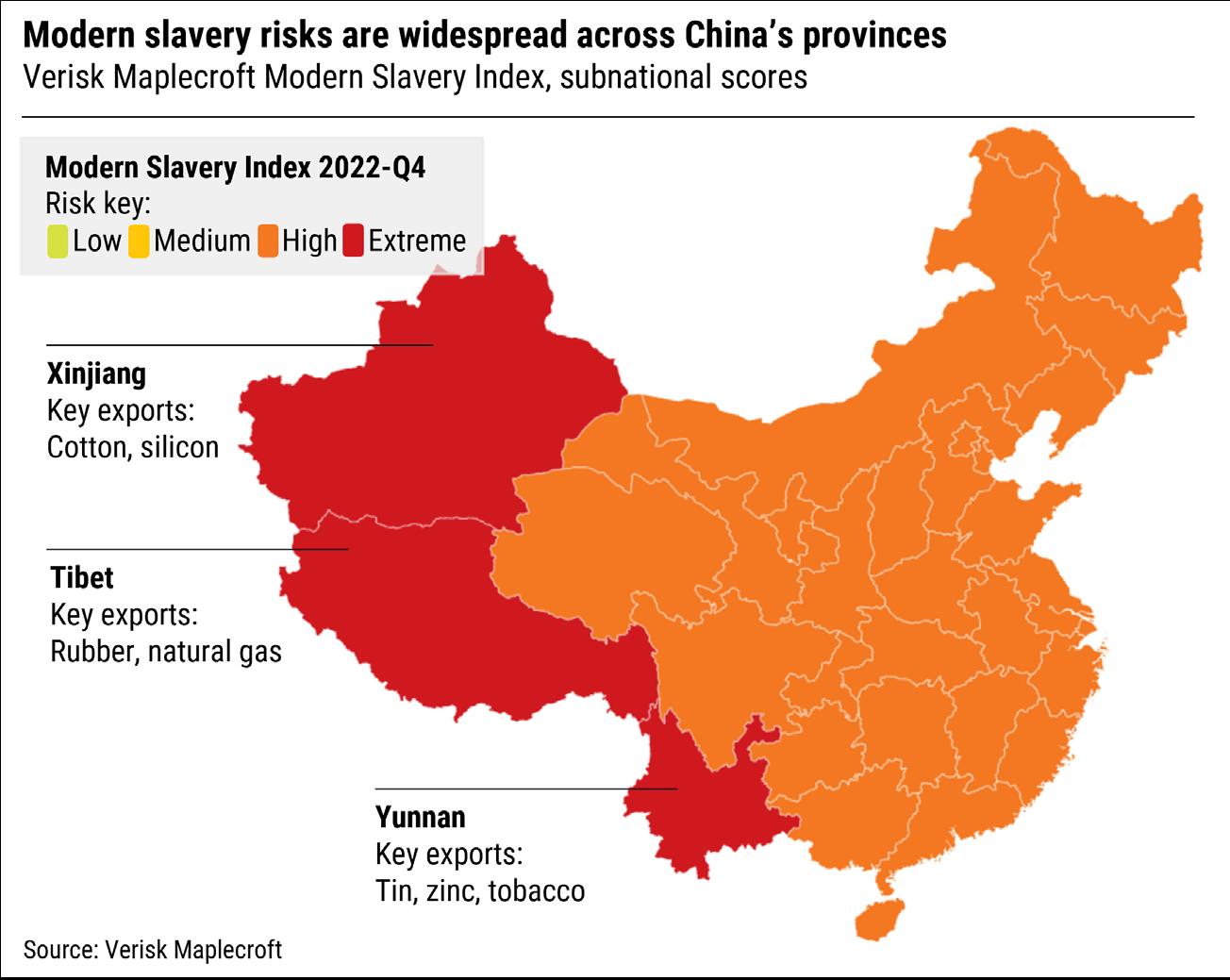
Diversifying production away from China might seem the obvious solution, but this is easier said than done commercially and alternative jurisdictions are far from risk free. For example, most of the countries prominent in solar and wind power supply chains are rated high or extreme risk on the MSI, highlighting the potential for modern slavery to taint ‘clean’ technologies.
Poverty and modern slavery linked, but developed countries not immune
Poverty has long been a key determinant in the prevalence of modern slavery. Poorer households are more likely to become dependent insecure and exploitative employment, which can give rise to further abuses.
This is reflected in the data: 17 of the 24 extreme risk countries on the latest edition of the MSI are low and lower-middle income economies. This group includes Myanmar and Pakistan, two leading exporters of goods including clothing, cotton fabric and rice.
But workers in developed economies aren’t immune to exploitation. The number of high and upper-middle income economies rated high or extreme risk on the MSI has risen to 44, up from 39 when the dataset launched in 2016.
Human rights due diligence key as negative headwinds grow
The factors driving the global uptick in modern slavery are set to worsen in the coming years. Rising inflation and a looming global recession indicate a period of prolonged economic instability. At the same time, even the most optimistic warming scenarios suggest that climate-driven migration will ramp up by mid-century. Combined, these issues will
leave millions more people vulnerable to exploitation.
As the regulatory landscape governing forced labour rapidly expands, companies that have traditionally relied on low-cost foreign workers face a growing dilemma, as they increasingly need to walk the talk when it comes to tackling human rights violations. This could be a significant challenge for organisations with poor visibility over their supply chains. Those that take the time to identify risks and implement best-practice sourcing standards will be best placed to manage these growing threats.
About the company
As organisations strive to understand and adapt to a fast-moving world, Verisk Maplecroft empowers them to put the environment, human rights and political risk at the heart of their decision-making. We do this by providing unparalleled intelligence on sustainability, resilience and ESG – stitching together these disparate issues into an interconnected global view, built upon objective insight and data. By thinking ‘big picture’ we capture what matters most to our partners; making positive outcomes possible in a time of change; helping people, business and societies become stronger; creating value with values. Verisk Maplecroft is a Verisk business (NASDAQ:VRSK). Find out more at www. maplecroft.com
GLOBAL ISSUES 32 / orient-magazine.com Issue 90 / January 2023
BA BETTER WORLD: PUTTING SUSTAINABILITY AT THE HEART OF BRITISH AIRWAYS
Just over a year ago, British Airways launched the BA Better World programme as part of their continued commitment to put sustainability at the heart of the business and to help build a better, more sustainable future. Just over a year later, BA’s Director of Sustainability looks back on some of the progress made.
by Carrie Harris Director of Sustainability, British Airways
Since launching the programme, we’ve been embedding the three key pillars of BA Better World – People, Planet and Responsible Business – across all parts of the airline to ensure we are delivering against our goals. Here are some highlights of the programme:
People
We’re working hard to ensure we’re a diverse and inclusive company.
Creating a diverse and inclusive workplace contributes to a sense of wellbeing and belonging, enabling our colleagues to thrive. This philosophy is embraced by our leaders, championed by our employee network groups and supported by our relationships with external partners. We’ve recently established a successful reverse mentoring programme, with senior leaders being mentored by a colleague from a diverse background to talk about their lived experience within our business, their career development and our organisational culture to help us ensure that we’re more innovative, creative and successful. We’ve also launched wellbeing roadshows and our new network of mental health first aiders to support colleagues and their families if they need it.
Planet
We’re focused on taking urgent action to tackle our climate impacts.
Now, more than ever, we need to take greater action to tackle the impact that flying has on our planet. We know we must do all we can to tackle climate change now. Because there is no greater priority.
Sustainability is not new to us. We already have a track record of leadership and three years ago, as part of our parent company International Airlines Group, we committed to achieving net zero CO2 emissions by 2050.
While there is no single solution to this challenge, we have a clear roadmap of short, medium and long-term initiatives to get there. In the short-term this includes improving our operational efficiency, investing in more efficient aircraft, funding carbon offset projects to mitigate emissions on UK domestic flights and progressively introducing sustainable aviation fuels (SAF). In the medium to longer-term we’re continuing to invest in the development and scale-up of sustainable aviation fuel, and looking at how we can help accelerate the growth of new technologies such as zero emissions hydrogen-powered aircraft and carbon capture technology.
ROAD TO NET ZERO /
BA BETTER WORLD: PUTTING SUSTAINABILITY AT THE HEART OF BRITISH AIRWAYS 33 / orient-magazine.com
In April 2022 we took in our first-ever supply of UK-produced sustainable aviation fuel, made from waste cooking oil. It’s now routinely delivered into Heathrow operations, so all BA flights leaving Heathrow now fly using a small proportion of SAF. We’re working on scaling up the development of SAF through several partnerships.
We’ve also continued to empower our customers by allowing them to make sustainable choices when flying with us. Now, if customers wish to reduce their carbon footprint further, in addition to the existing option for customers to offset their emissions, they can purchase sustainable aviation fuel in combination with high-quality verified carbon offsets. This can be purchased online before or after their journey, or via our onboard Wi-Fi portal directly from their seat. This can all be done on our new and upgraded online platform, called CO2llaborate, accessible for both individual and corporate customers, in partnership with climate tech company CHOOOSE, further helping passengers understand, calculate and address their travel emissions. CO2llaborate features more precise emissions calculations and a new adjustable slider to give customers more control over the amount of SAF versus verified carbon offsets they wish to purchase.
Responsible Business
We’re actively supporting communities around the world and engaging customers in our sustainability programme.
For more than 30 years we have supported our colleagues and customers in charitable giving in the communities we serve worldwide. In March 2022 we launched our new BA Better World Community
SPECIAL OFFER
BritCham Singapore members enjoy 10% off airfares with their exclusive BritCham discount.
Visit https://britcham.org.sg/ member-discounts/britishairways to access the discount link, terms and conditions.
Fund to support projects across the UK, which has already delivered more than £760,000 of funding to over 30 charities, and these non-profit organisations are delivering positive change across social inclusion, environmental protection and climate action and through access to education and employment.
In times of crisis, British Airways works with partners including the Disasters Emergency Committee (DEC) and the British Red Cross, to ensure that vital relief gets to where it’s needed as quickly as possible, helping to save lives and rebuild communities. We have recently sent aid for emergency responses in Ukraine, Pakistan and India. In May 2021 we sent 27 tonnes of medical aid to Delhi to support communities facing rising Coronavirus cases.
Positioning sustainability at our heart to deliver transformational change is a huge challenge, but it’s also a privilege. Over the last year, I’ve been able to share our vision for BA Better World, and it’s been inspiring to receive such a positive response from colleagues and customers from all over the world. We’re excited to bring together our people, customers and partners as we continue to develop our sustainability strategy and deliver what we believe will be our greatest achievement.
About the company
As a global airline and the UK’s flag carrier, British Airways has been flying its customers to where they need to be for more than 100 years. The airline connects Britain with the world and the world with Britain, operating one of the most extensive international scheduled airline route networks together with its joint business, codeshare and franchise partners. British Airways flies to destinations in more than 65 countries. Its principal place of business is London, with its main home at Heathrow Terminal 5. In 2021, the airline won six Business Traveller Awards including Best Short-Haul Carrier, Best Airport Lounge, Best Frequent Flyer Programme, Best Travel App and Best New Seat. In September 2021, British Airways launched its sustainability programme, BA Better World, committing to put sustainability at the heart of everything it does and with a clear roadmap to achieve net zero carbon emissions by 2050. British Airways is a founding member of the airline alliance oneworld, which serves around 1,000 destinations across the globe. The latest information on the measures British Airways is taking to ensure its customers have a safe experience when travelling can be found on ba.com. The British Airways press office can be contacted at press.office@ba.com. To book visit BA.com and connect on Facebook @BritishAirways and Instagram @british_airways.
ROAD TO NET ZERO Issue 90 / January 2023
Panellists L-R: Mark Florance, Co-Chair, BritCham Singapore, Energy & Utilities Business Committee; Climate Investor One, Singapore; Rob Cooper, Senior BD Manager, Asia, Regions, Corporates & Solutions BP, Singapore; Peter Godfrey, Vice President APAC, Storegga and Managing Director, APAC - Energy Institute; Mauricio Riveros, Associate Director, the Carbon Trust, London; Nick Dingemans, Partner, Penningtons Manches Cooper, Singapore
ROAD
TO NET
ZERO / COLLABORATION OPPORTUNITIES IN SINGAPORE AND ASEAN’S GREEN ENERGY ECONOMY
BritCham’s Energy & Utilities Committee hosted a Thinktank Roundtable at Singapore International Energy Week in October for the third consecutive year. A summary of the discussion follows.
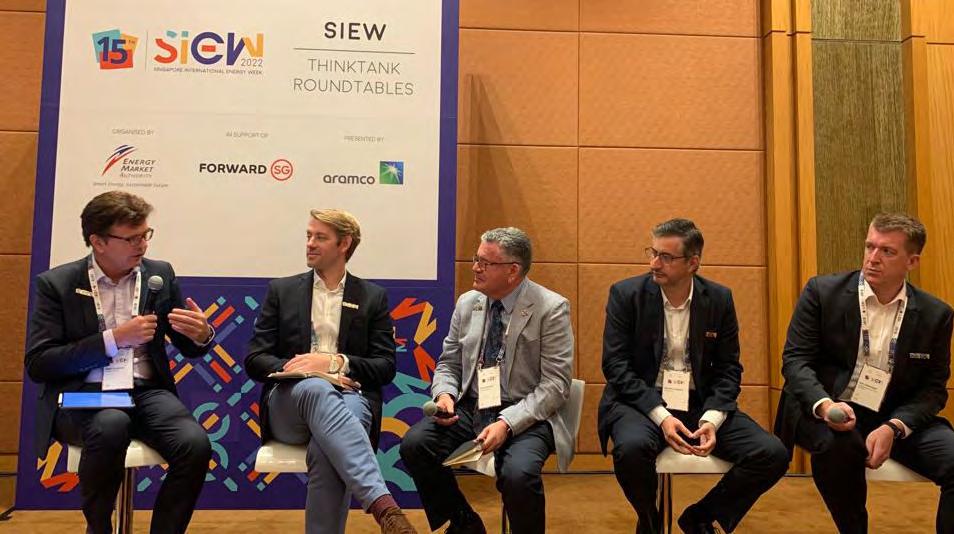 by Tim
by Tim
Issue 90 / January 2023 35 / orient-magazine.com
Rockell, Nick Dingemans, Peter Godfrey, Mark Florance, Rob Cooper and Xinying Tok
TheUK has established itself as a leader in industrial-scale test beds for green energy. This roundtable illustrated project examples, including policy and commercial development, for industrial decarbonisation, developing hydrogen at scale, the utilisation of new and existing infrastructure, carbon capture and storage, and city-scale projects.
Following the success of past virtual Thinktank Roundtables as part of the official programme for SIEW, the British Chamber’s Energy & Utilities Committee was invited to participate in the first fully in-person edition since Covid. Starting with a fireside chat between Committee Chair Tim Rockell, Managing Director, Energy Strat Asia and Tom Moody, Regional Director SE Asia, Climate and Energy at the UK’s Foreign Commonwealth and Development Office, the discussion focused on the key policy tools to drive a green economy on ASEAN, including what had been implemented already during the UK’s COP26 Presidency, and the upcoming COP27.
The conversation moved into a panel discussion with strong expertise
in creating hydrogen and carbon capture clusters across the region. The session ended with a case study of city-based collaborative industry and public sector projects in the UK and their relevance for ASEAN. This featured moderator Mark Florance, Co-Chair of the Committee, of Climate Investor One, with panellists Rob Cooper from BP, Peter Godfrey from The Energy Institute and Storegga, Mauricio Riveros from the Carbon Trust and Nick Dingemans from Penningtons Manches Cooper.
Key policy tools to drive a green economy
The fireside chat with Tom Moody and Tim Rockell covered the ASEAN regional developments since the UK hosted COP26 in 2021 and looked ahead to what’s next for the region from COP27 in Egypt, 2022, and COP28 to be held in the UAE in 2023
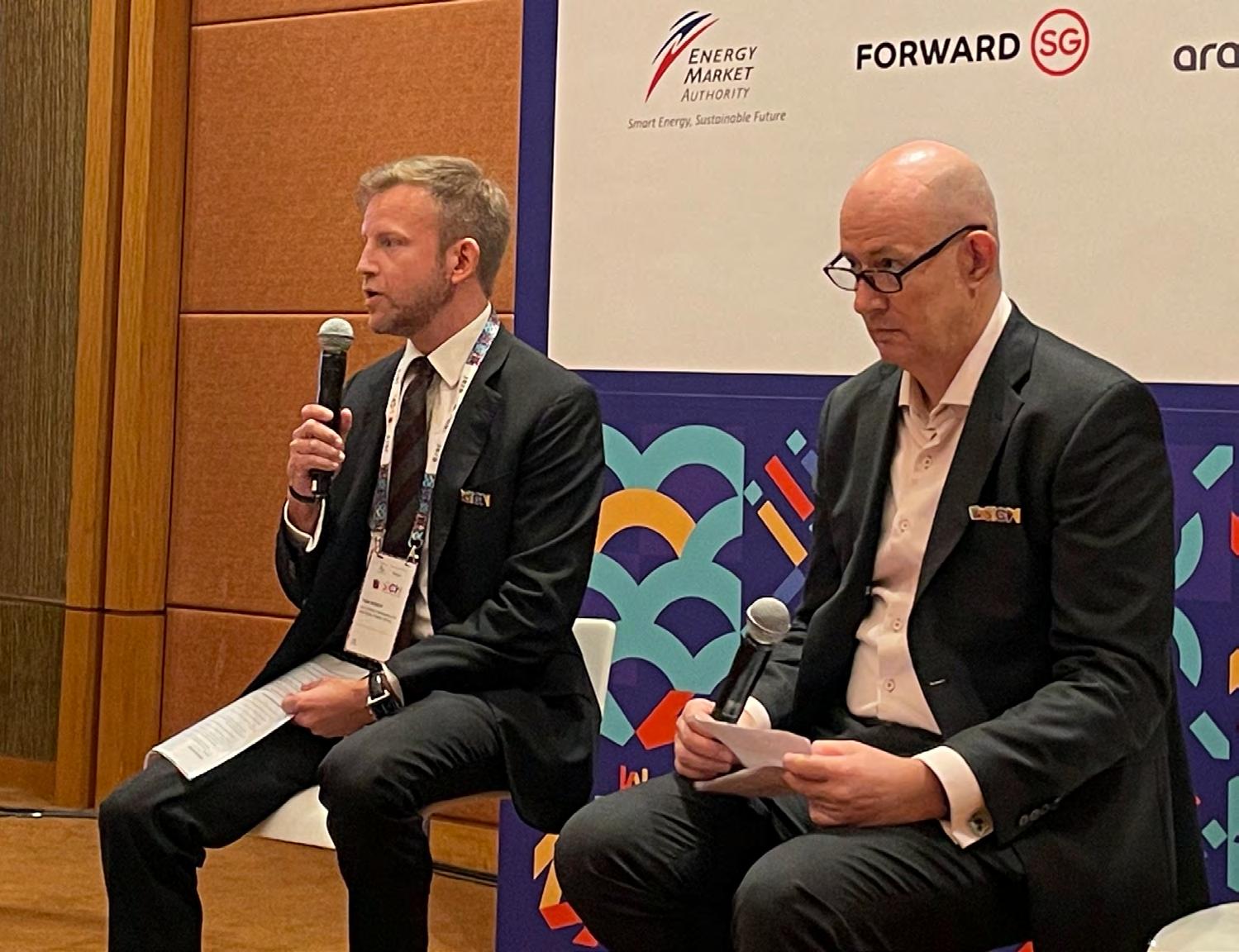
Progress has been made on green energy projects in ASEAN, and cross-border policy development goals backed by the UK, 1.5c aligned Net Zero commitments now cover 85% of the region’s emissions during
UK’s COP presidency so there is much government-government attention on ensuring those are matched with implementation plans, and 2030 Nationally Determined Contributions which are consistent. A focus on enabling a ‘Just’ energy transition has seen two projects in the region born out of the UK’s COP26 and G7 Presidencies - in Indonesia (led by US and Japan on behalf of G7) and Vietnam (led by UK and EU).
But we cannot take our foot off the pedal. The UK aims to keep momentum from Glasgow. COP27 focused on implementing the progress promised by Governments at COP26 such as phasing out coal, and new post-2025 donor country funding for climate projects. The UK is leading several initiatives around the region and ASEAN and Climate will stay at the top of the UK government’s agenda for the rest of the decade.
Carbon Trust-led Clean Hydrogen Innovation Program (CHIP)
The Carbon Trust highlighted its new UK hydrogen accelerator which launched in October this year. The programme seeks to align industry players and speed up the deployment of clean hydrogen, providing a solution for the disparate forecasts regarding hydrogen production and end use. Through industry-wide collaboration it aims to support innovation and reduce end-to-end costs, with the ultimate goal of making hydrogen cost-competitive with conventional alternatives. The programme addresses the key challenges identified by the UK Government’s Hydrogen Strategy.
Fifty stakeholders consulted in its design, CHIP follows the same approach as other highly successful collaborative innovation programmes run by the Carbon Trust, including its Offshore Wind Accelerator, which has helped accelerate the growth of offshore wind.
Mauricio Riveros, Associate Director, the Carbon Trust, London set out the goals of the programme. To bring about industry-wide buy-in, and targeted action to address current blockers, the goals of this accelerator model include:
• Sustained industry engagement
• Co-created with industry, needs based
ROAD TO NET ZERO Issue 90 / January 2023 36 / orient-magazine.com
Rob Cooper, Senior BD Manager, Asia, Regions, Corporates & Solutions BP, Singapore and Tim Rockell, Chairman, BritCham Singapore, Energy & Utilities Business Committee; Managing Director, Energy Strat Asia, Singapore
• Pooling knowledge and skills
• Stimulation of supply chain solutions
• Sharing costs and leveraging funding
• Reducing R&D risk
Creating hydrogen and carbon capture clusters across ASEAN
A showcase led by Mark Florance with Nick Dingemans and Peter Godfrey, on the techno-economic and policy development features of decarbonisation projects already underway in the United Kingdom and the region including the UK’s East Coast Hydrogen project and the Acorn carbon capture and storage projects featuring the UK’s carbon capture specialist, Storegga.
These projects have applicability for ASEAN with lesson to be learnt on utilising existing infrastructure, and building new, and building a nationally focussed supply chain to meet capital project development and their ongoing operations. There is understanding to be gained from the likely pace of change in areas of technology adoption.
Realising carbon capture and storage projects in ASEAN will require significant regulatory development and associated cross border agreements. There is an opportunity to leverage lessons learned and good practice in the UK as well as experience being gained working on the development of CCS projects elsewhere. Issues such as the cross-border transportation of CO2 (considered a waste product) and the regulatory framework together with the allocation of risk between the commercial developers of CCS projects and government and the ultimate commercial model for CCS have all been address in the UK and in the other European projects. ASEAN needs
to address both the regulatory framework as well as the ultimate commercial mode.
It is important to recognise that ultimately CCS must be developed as a means of maximising capacity for carbon storage/ sequestration as opposed to being considered as an adjunct to the production of more hydrocarbons whether these be coal, oil or natural gas. Carbon credits for CCS projects (particularly in the voluntary markets) are unlikely to be available where the storage is an adjunct to enhanced hydrocarbon production but will be available were the CCS project to provide real additionality.
CCS will also provide the ability to transition to a hydrogen economy at scale. The availability of green hydrogen (and the requisite renewable energy) is potentially limited in ASEAN. CCS allows for the potential of Blue hydrogen (through steam methane reforming) using existing natural gas infrastructure and supply chains.

A showcase of work in cities with a showcase of Aberdeen
With city-based decarbonisation important for ASEAN’s metropolises and secondary cities, a showcase of the work by bp in this space in Aberdeen was set out by Rob Cooper.
bp is working with organisations from the public and private sector to reimagine and integrate the delivery of energy and mobility to help cities decarbonise. Cities account for more than 70% of global emissions. They consume around two thirds of global energy, and this is set to grow, so for the world to get to net zero, cities must lead the way.
In Aberdeen, bp has set up a Joint-Venture with the City to help create an integrated hydrogen hub. Phase 1 includes building a green hydrogen facility supplying bus and truck fleets, developing a new solar farm, and stimulating supply chain, skills, and training. Future phases include expansion through ScotWind, supply of heat for housing, industrial buildings, rail and maritime sectors, and hydrogen for export.
Summary
The Chamber is grateful to the support of SIEW and the EMA in facilitating this roundtable. Policy development is of key concern in markets where predictability and precision on the direction of travel is required to transition at scale and ensure that ambitions on social mobility and justness of outcomes for all people across ASEAN are considered and met.
The private sector is ready to do its part and the chamber is ready to direct enquires on opportunities in ASEAN and highlight case studies from the UK such as those outlined above where lessons-learnt can be taken on board as the region develops projects and builds its own supply chain around new technologies that will need to be adopted.
The work of the committee can be found here and past work on topics such as hydrogen, carbon markets and interconnectivity and smart grids on the chamber’s YouTube channel
Issue 90 / January 2023 37 /orient-magazine.com
WHAT DOES THE FUTURE HOLD FOR THE GLOBAL MEDIA LANDSCAPE IN 2023?

― Are physical media activities finally returning? Find out the ways global consumers adjusted their engagement with information and entertainment amidst various global phenomena, and how are they likely to evolve their media consumption patterns.
Globally, digital media, streaming activities and interacting with social media are set to see the biggest increase in consumption over the next year.
The media industry is facing new challenges as a result of the effects of significant global events such as the easing of the global pandemic and the cost-of-living crisis. How have consumers across the globe changed how they interact with information and entertainment in these modern times, and how are their media consumption habits likely to change?
According to YouGov’s report, digital media is becoming more prevalent in everyday life, with more than 9 out of 10 (95%) global consumers visited social media/ apps in the past 12 months and a similar proportion (93%) intending to do so in the next 12 months.
by YouGov
Our data also shows a decline in consumption for traditional media such as listening to the radio and reading newspapers or magazines in print or online. In contrast, digital activities saw the largest increases in consumption in the previous 12 months, with more than three in ten stating they spent more time accessing websites or apps, streaming video, and interacting with social media.
SECTOR INSIGHTS /
SECTOR INSIGHTS Issue 90 / January 2023 38 / orient-magazine.com
Discover the data for the rest of the activities in our detailed full report here
While the outlook across all media types is nearly identical, with most people intending to do the same, in-person activities experienced the largest decline in the previous year. YouGov research shows that more

than a third of global consumers (34%) have attended fewer live events in the last 12 months, and almost four in ten visited the cinema less often.
One of the report highlights is the media stickiness for 2023. We define stickiness as those who claim to have maintained or increased their consumption of each media type in the last 12 months and are
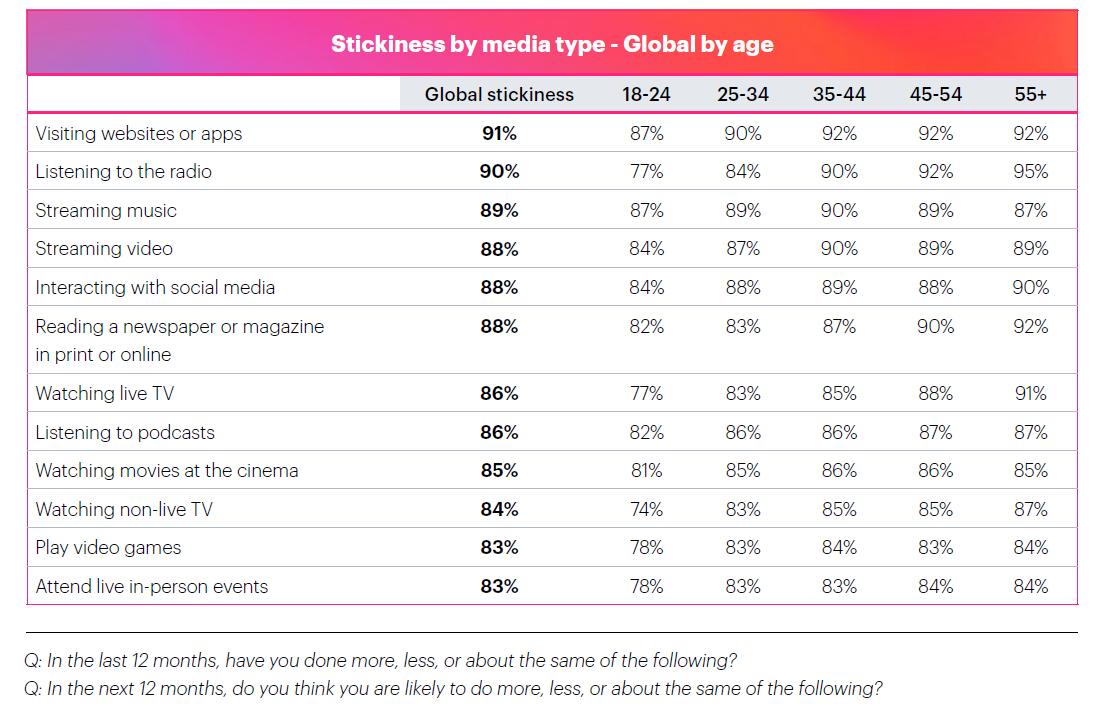
likely to maintain or consume more in the next 12 months. Our research reveals that global consumers are creatures of habit, with more than eight in ten intending to stick to their consumption of all media types in the coming 12 months.
Younger adults appear to present a loyalty challenge for marketers and
WHAT DOES THE FUTURE HOLD FOR THE GLOBAL MEDIA LANDSCAPE IN 2023?
advertisers. While stickiness levels remain high for all media types among 18–24-year-olds globally (ranging from 74% to 87%), younger adults are less loyal and less likely to stick with their media choices than older generations, particularly for more traditional media activities such as listening to the radio, reading a newspaper or magazine, and watching live and non-live TV (see table on previous page).
We also examine which media activities are the growth drivers. More than a third (35%) of global consumers who either maintained or increased their video streaming consumption in the last 12 months are likely to increase their use of video streaming services in the next 12 months. This is followed by streaming music, with a growth driver score of 34%.
Surprisingly, attending live, in-person events (35%), and going to the movies (34%), are activities that scored the top growth driver score globally, these scores are similar to streaming video. This implies that current consumers’ desire to engage in more outdoor activities over the next 12 months is comparable to their interest in streaming digital content (see below).
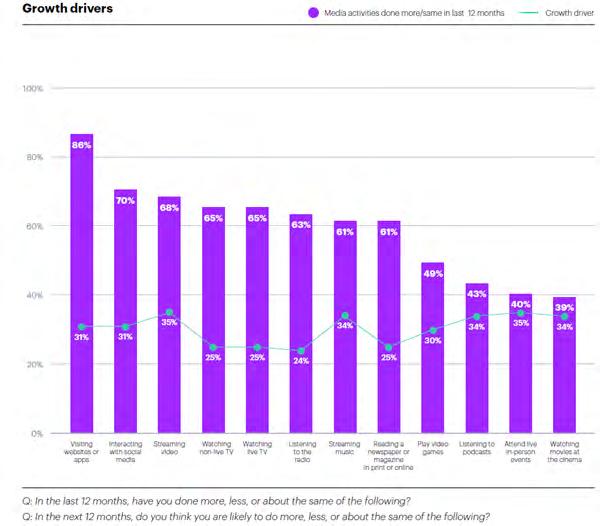
This development opens up many opportunities and possibilities for the movie and events industries. Many marketers recognise the value of these increasingly engaged audiences and have raised their cinema and events budgets to reach them. However, the difficulty facing the industries is how to convince customers who are still hesitant to engage in these activities to think about returning.
Video streaming is one of the top growth drivers globally. Our study found that 35% of global consumers increased their video streaming consumption in the last 12 months, and this figure drops to 26% who are likely to increase their viewing in the next 12 months, suggesting growth is plateauing. However, YouGov research shows that across the international markets surveyed, 37% of global consumers currently subscribe to and plan to continue their subscription video on demand (SVOD) services next year, and this is higher than other types of paid-for content services (see opposite page).
In order to create an effective outreach plan or marketing campaign, it is crucial to consider the growth drivers and understand which media will stick, which will grow, and
SECTOR INSIGHTS
how the media landscape will evolve. To uncover other insights and get a deeper understanding of the changing media behaviour in the upcoming year, download the full whitepaper here. YouGov also provides regular media data and real time insights to help you make the best business decisions.
Methodology
The insights in this report are drawn from a recent global Custom survey on the Global media sector, specifically past media consumption patterns and the future global media landscape, covering 18 global markets of more than 19,000 respondents. Our survey was fielded the week of 10th August to 25th August 2022.

The YouGov panel provides a naturally accurate and representative view of the population. Data is adjusted using a mild weighting team using interlocking demographic characteristics—methodology considered advanced in the market research space.
About the company
YouGov is a global provider of analysis and data generated by over 17 million registered panelists in more than 59 markets. Founded in the UK in 2000, YouGov is considered the pioneer of online market research. Our unique fully integrated online model has a well-documented and published track record illustrating the accuracy of its survey methods and in turn the quality of its client service work. We can conduct research in all continents and our online model allows clients to get international results faster and more cost-effectively than traditional methods, with no compromise on quality. Find out more at https://business.yougov.com/.
WHAT DOES THE FUTURE HOLD FOR THE GLOBAL MEDIA LANDSCAPE IN 2023? Issue 90 / January 2023 41 / orient-magazine.com
“We also examine which media activities are the growth drivers. More than a third (35%) of global consumers who either maintained or increased their video streaming consumption in the last 12 months are likely to increase their use of video streaming services in the next 12 months. This is followed by streaming music, with a growth driver score of 34%.”
BUSINESS SUPPORT / LEGAL KNOWLEDGE UPDATES –HIGHLIGHTS FROM 2022

― It is both a challenging and changing landscape for emerging companies operating out of Singapore. Whilst remaining on top of macro-issues, there have been some developments covering areas such as fundraising, company registers and personal data that need to be borne in mind. Read on for a short summary of these key developments.
by Sam Ng, Of Counsel, James Fisher, Associate and Denise Loh, Senior Associate at CMS Holborn Asia
Investments
and Fundraisings in Singapore
If your business is looking to raise funding in 2023, there is never a better time to check out the Singapore Venture and Private Capital Association’s Venture Capital Investment Model Agreements (VIMA) 2.0 kit , updated in September 2022 to incorporate feedback from user and industry consultations.
The documents in the VIMA 2.0 kit – including a short/long form term sheet, subscription agreement, shareholders’ agreement and model constitution – are often used as a starting point for early-stage investment deals
in Singapore as they contain a set of basic provisions which could help narrow the scope of open issues in a funding round, thus making for a smoother fundraising/negotiation process. The main updates in the VIMA 2.0 kit are:
1) additional annotations and alternative provisions in the initial set of model agreements – term sheet, shareholders’ agreement, subscription agreement, convertible agreement regarding equity – to provide better guidance to users and reflect market developments since 2018;
2) the introduction of new model documents and agreements – constitution, founders’ agreement, convertible
BUSINESS SUPPORT Issue 90 / January 2023 42 / orient-magazine.com
note, and employee share option plan primer and schedule – to provide a more expansive suite of documents to get your business up and running; and
3) the introduction of short and longform Environmental, Social and Governance (ESG) letter agreements for incorporation of ESG-related provisions and obligations into transactions. ESG is the new hot topic throughout many industries, so be sure to read these!
Company Registers in Singapore
On the topic of general corporate compliance, the Corporate Registers (Miscellaneous Amendments) Act 2022 of Singapore came into force on 4 October, following which:
1) local and foreign companies are required to set up a register of nominee shareholders, which is to be maintained at its registered office or at the registered office of its appointed registered filing agent; and
2) companies and limited liability partnerships (LLP) which cannot identify a registrable controller with “significant interest” or “significant control” are required to identify individuals with executive control as their registrable controller(s); i.e. company director(s) with executive control and the company chief executive officer; and LLP partners with executive control. Such individuals’ prescribed particulars must be recorded in a company’s or LLP’s Register of Registrable Controllers (RORC) and lodged with the central register of the Accounting and Corporate Regulatory Authority of Singapore within 2 business days of the RORC being updated.
Data Protection in the Region Singapore
The enhanced financial penalty for breaches of the Personal Data Protection Act 2012 took effect from 1 October 2022 namely:
• S$1million, or
• a maximum of 10% of annual turnover for organizations with an annual turnover that exceeds S$10million, whichever is higher.
The financial penalties levied may likely increase across the board, regardless of whether the organisation crosses
the annual turnover threshold. Australia has most recently enacted even more severe fines for breaches of its privacy legislation.
Indonesia
After years of deliberation, Indonesia’s Personal Data Protection Law (PDPL) came into effect on 17 October 2022. The PDPL is a welcomed move amid the spate of data security breaches in Indonesia. The PDPL applies to any person that carries out legal actions in Indonesia and to any person that carries out legal actions outside of Indonesia if such actions have a legal impact in Indonesia or for Indonesian subjects who reside outside of Indonesia. Organisations will have two years to comply with the new requirements under the PDPL.
Thailand
Thailand’s Personal Data Protection Act (PDPA) came into effect on 1 June 2022 after three years of delay and is Thailand’s first consolidated law on data protection. The PDPA applies to the processing activities of a controller or processor who has an establishment in Thailand, as well as a controller or processor outside of Thailand to the extent they are offering goods or services to individuals in Thailand or monitoring the behaviour of individuals in Thailand.
Vietnam
Currently, there is no single comprehensive law governing the collection, storage and use of personal data in Vietnam. Vietnam’s data protection laws are covered by various legislation, including the Civil Code, Penal Code, Law on Network Information Security, Law on Cybersecurity, Law on Information Technology, Law on Telecommunications, Law on Consumer Protection, and Law on E-Transactions.
The Ministry of Public Security released a draft personal data protection decree in February 2021 for public consultation, and it is expected to be finalised by early 2023. The new decree is expected to be a major overhaul of Vietnam’s data protection regime.
About the company
CMS Holborn Asia is a full-service legal services provider assisting clients in Singapore and throughout the Asia Pacific region. We focus on transactional, commercial, regulatory and dispute advice and have particular experience in the key areas of technology, media, telecommunications, life sciences, infrastructure, construction, energy, finance, fundraising and M&A.
CMS has over 25 lawyers based in Singapore, including those qualified in the UK, Singapore, Australia, Indonesia and Malaysia. Many also have native bilingual proficiency in many languages, including Malay, Tamil, Indonesian and Mandarin.
CMS and its individual lawyers are consistently recognised by respected legal and industry directories such as Chambers, Legal 500 and Who’s Who Legal. CMS Holborn Asia is a formal law alliance between CMS Cameron McKenna Nabarro Olswang (Singapore) LLP and Singapore law practice Holborn Law LLC. For more details visit https://cms.law/en/sgp/
LEGAL KNOWLEDGE UPDATES - HIGHLIGHTS FROM 2022 Issue 90 / January 2023 43 / orient-magazine.com
WHY EUROPEAN CORPORATES SHOULD VENTURE BUILD IN ASIA

― Being part of the next decades of growth in this region will require local approaches. Innovation from Europe won’t cut it anymore.
by Sebastian Mueller, Co-Founder at MING Labs, Joachim Vandaele, Founding Partner at Wright Partners, and Ziv Ragowsky, Founding Partner at Wright Partners
It is no secret that Asia has been and will continue to be one of the vital growth motors of the global economy in this century. With China making leaps and bounds over the last four decades to become the world’s second-largest economy and India steadily raising their output, South-East Asia as a region is often overlooked but just as important. The potential is significant, with more than 400 million people and comparatively young labour forces combined.
In our observation, European companies have often looked at Asia through three regional lenses — China, India, and the rest of Asia. Strategically, they started working with countries and companies in this region to build resource supply and manufacturing capabilities. They then started focusing on sales and marketing as budgets and affluence grew to levels they felt make a good market for them.
While these strategies, particularly the first, have led to a level of success, they will not address the real market potential this region has to offer that way. Therefore, if European corporates want to be a part of the growth story in this region over the following decades, they will have to rethink their approach and strategies.
In our experience with helping European companies
innovate in various countries in Asia, there are several critical challenges that their European-designed products and services face in the local markets.
Diverging Consumer Preferences
While the globalisation movement of the last decades has introduced many consumers in Asia to Western products, which have been seen as aspirational for a good part of that time, local preferences are diverging. With more local offerings in mid- and high-end markets and local creatives finding their footing, there is plenty on offer that reflects consumers’ tastes here. We see an increasing move towards diverging local preferences, which require adaptation.
Differing Cultural Norms and Industry Structures
For B2C companies, cultural norms and values are an essential factor in the appeal of their products, whereas for B2B companies understanding the structure of industries locally and where their place can be is critical. Both elements are significantly different in (and in between) Asian markets compared to Europe. And where in the past local customers adapted themselves
BUSINESS SUPPORT /
BUSINESS SUPPORT Issue 90 / January 2023 44 / orient-magazine.com
to the offerings from the West, increasingly, they will need the other way to be successful.
Different Approach to Value Capture and Creation
In the eyes of European corporates, customers in Asian countries are notoriously price-sensitive. There is the perception that they will only for the lowest price and that premiums are hard to come by. In our experience, we do see that unit prices are essential. Yet, there is a strong interest and willingness for innovative pricing and collaboration models, which create a win-win and increase value creation and capture for all parties. This might involve sharing particular risks and expenses, yet working towards mutual success and sharing in that upside.
Trust Networks and Reliability
As financial, political, and legal systems and landscapes were not the most reliable for an extended period of development in many Asian countries, business is done with a heavier reliance on trust. While in Europe, good faith in a counter party tends to be given upfront, and the collaboration principles encoded in contracts and formal agreements, trust in South-East Asia needs to be earned.
In Asia, repeated display of goodwill and transactional reliability, will be rewarded with deep relationships of trust. This however implies a new market entrant to actively invest in building these relationships, through taking risks, and providing value to the counterparty.
This is hard to achieve by putting a sales or marketing resource in a new Asian office, and for the company executives to fly in once in a while. Instead, local teams need the resources and the autonomy to build these trust relationships, and assume the ownership and risk that are associated with them. This is why it might be better to build these relationships through a capable venture team, rather than to assume the equity of a European brand will translate into business in Asia.
The Strategic Case for Venture Building in Asia
Many of the problems that currently slow down SEA growth are problems European companies have experienced in the past (e.g., irrigation and support of agriculture). In addition, many solutions created in Europe can be applied in SEA differently allowing for potentially even better impact in the region. This opens opportunities for new products and innovations coming from Europe to open new markets and add significant value to the region. Yet that alone is not sufficient to succeed. Given the listed challenges increasing in intensity, European corporates have several strategic options in response.
Core Innovation: Innovating around existing products and services locally by adapting them to local requirements and structures is critical in staying competitive with that business. Resources and autonomy are needed in the region to pursue those innovation projects close to customers and work with them.
M&A and Investments — Portfolio expansion through investments and acquisitions in/of local companies can help to acquire key trust holders and local capabilities at speed strategically, to be able to respond faster to changes that are happening, and help to move the core forward.
Venture Building — Building new ventures locally, leveraging the corporate advantage for new, market-specific value propositions, allows corporations to truly innovate local-for-local (with the potential of globalising the ventures that started locally). Venture-type innovation is focused on business models and offerings very different from the core, which can evolve quickly with a dedicated team and standalone entity, that does not have to bear the brunt of the corporate overhead.
While all three strategies have their Pros and Cons, we see an increasing opportunity for European corporations to build investable, risk-aligned ventures locally in Asia. This opportunity is driven by the growing availability of regional entrepreneurial talent, a maturing market and funding landscape for
ventures, and the need for speed in emerging market opportunities, which corporates can not deliver on.
Several European multinationals, such as Bosch, Yara, Engie, Schneider Electric, Bayer, and more, have already built corporate ventures in Singapore for the region, seeing the need for local innovation to address and capture new market opportunities locally fast and build the future businesses where the prospective customers are.
Conclusion
Given the myriad opportunities that exist or are yet to arise in South-East Asia, there is enormous growth potential. If European companies want to be a part of that growth, the playbook has to change from “Innovation-from-Europe” to “European-Innovation-In-SEA”. A local approach is required to succeed in these markets where consumers are increasingly spoiled for choice and local competitors are faster and more adapt to what is desired.
Venture building is a great strategic tool to accelerate this progress, as it allows a relatively standalone entity imbued with the corporate advantage to move fast locally and iterate towards attractive and successful offerings for local markets. When given the necessary resources and freedom, the entrepreneurial approach to building new businesses yields superior execution power to a remote marketand-ship model.
About Ming Labs
We are a leading digital innovation and transformation company. We make businesses future-ready by design. Ready to start transforming for the better? Book a discovery call at transform@minglabs.com
About Wright Partners
Wright Partners builds risk-aligned, investable corporate ventures. Drop us a line at contact@wright.partners to learn more about how you can build a corporate venture in Asia. And ask us how you can leverage the Singapore Government’s Corporate Venture Launchpad 2.0 programme to build your next corporate venture.
WHY EUROPEAN CORPORATES SHOULD VENTURE BUILD IN ASIA Issue 90 / January 2023 45 / orient-magazine.com
BUSINESS SUPPORT / HOW FAR ARE YOU ON THE PATH TO BECOMING A DATA DRIVEN COMPANY?
Many companies aspire to continuously generate value and competitive advantage through data and artificial intelligence (AI) technology. What does this journey towards being a data-driven company look like? And what barriers do companies face along the way?
 by Steve Nunez Head of Data & AI, Zühlke Asia
by Steve Nunez Head of Data & AI, Zühlke Asia
The potential of data and artificial intelligence is vast and beyond dispute. By 2030, AI technologies are expected to contribute around $15.7 trillion to the global economy. Most companies invest in data and AI projects, but many report that the potential of these projects is only partially exploited.
We surveyed over 110 international businesses in a study to understand how decision-makers view the potential of data and AI, how far companies have advanced towards becoming a data-driven company, and what obstacles they are encountering.
BUSINESS SUPPORT Issue 90 / January 2023 46 / orient-magazine.com
5 typical barriers companies face in becoming data-driven

1. An inactive data innovation pipeline
A key element for a data-driven company is an active data innovation pipeline. This refers to the continuous planning and implementation of data and AI projects that generate value for the organisation. However, this pipeline is not active in many companies due to the misalignment between business goals and technology or the lack of a defined strategy.
43.6% of respondent companies thought that AI initiatives failed because there was too little consideration of business success or too much emphasis on technology. The second-most common driver was the lack of a company-wide data and AI strategy (33.6%).
2. Proof-of-concepts falling by the wayside
Proof-of-concept (PoC) studies act as a checkpoint where the feasibility of projects is reviewed. Many projects remain stuck at this phase due to a narrow PoC or insufficient expertise for operationalising use cases.
32.7% of respondent companies indicated that their AI initiatives faced problems associated with PoCs. The most frequently cited reason (40.9%) was the poor quality of data and models.
In an example at a plant construction company, we found a lack of infrastructure for operationalisation. Although the project team developed good models, it was unable to progress beyond the PoC as there was no direct access to the customer’s systems. Creating access would mean integrating multiple systems across the globe, costing millions.
3. Technically perfect solutions are not used as planned
A user group may fail to use an application as planned. This may be caused by a solution that is insufficiently tailored to real-life practice, prejudice against AI solutions or user experience difficulties.
Failing to integrate AI solutions was the most common reason for the users failing to adopt the solution (52.7%). Further reasons cited were insufficient training of end users and distrust towards AI solutions.
In one project with a vehicle manufacturer, a pilot MVP AI solution was developed to forecast demand for replacement parts. However, it emerged that the predicted parts were either so small that inventory was always available on hand anyway or so large that they had to be ordered. This meant that the solution delivered no added value for its users.
Technical competencies represent a major barrier for successful implementation of data and AI projects. Some companies are unclear about what skills is required. Others may have the right job profiles, but their employees are unable to apply their skills because of sub-optimal structures.
55.5% mentioned that the lack of collaboration was a major issue. This shows the importance of deploying in-house data consultants who have experience in implementation projects and can build bridges between teams.
4. The data itself
While many companies already have valuable datasets, they don’t make them available in a structured way. Together with availability, data quality is often cited as a barrier.
49.1% said that while the necessary data had been gathered, it was not readily accessible.
HOW FAR ARE YOU ON THE PATH TO BECOMING A DATA-DRIVEN COMPANY? Issue 90 / January 2023 47 / magazine.example.com
“The era of experimentation in AI is over. You expect to see tangible results from AI investments. And we believe that an integrated and holistic approach is the way to achieve this.”
Another frequent statement was that the relevant data was of poor quality (45.5%).
How far have companies progressed on their journeys?
We identified 3 levels of maturity during a cluster analysis to understand how these companies progressed to becoming a data-driven company.
1. “Innovation” – They face challenges across all five barriers
These companies recognise the potential and significance of data and AI. However, there was a lack of holistic implementation concepts.
2. “Foundation” – They experience challenges in the last two barriers
These companies can be found further along the journey, but they face challenges in establishing foundations commonly associated with data-driven companies.
3. “Data-driven” – They can already be described as data-driven

These companies are the most advanced along the journey to a data-driven organisation but continue to anticipate an uptrend in data analytics and AI use in the near future.
Becoming a data-driven company
From the barriers identified, we derive the following success principles for data and AI projects:
• Company-wide planning and orchestration
• Business orientation
• Early user involvement of AI solutions
• Fast and agile execution, plus a willingness to learn as an organisation
Organisations can incorporate these principles within a data-driven company framework in 3 main steps:
1. Determine the vision at the C-Level
Set up a core team at the management level to align decision-making, develop a strong vision and formulate outcomes that the company aims to achieve. This ensures that the whole company can be aligned on this journey.
tion, choose use cases with sound prospects for success. These projects will serve as a beacon and strengthen internal acceptance of the company’s transformation.
“The era of experimentation in AI is over. You expect to see tangible results from AI investments. And we believe that an integrated and holistic approach is the way to achieve this.”
By laying the right foundations and fostering an open culture, companies can progress on their journey to be more data-driven, paving the way for organisations to operate efficiently, compete effectively and navigate the digital future.
2. Define the data
strategy and establish AI portfolio management
Develop a data strategy using the company strategy as a starting point, then operationalise it through a portfolio of concrete projects and initiatives. Furthermore, a portfolio process in place can function as an impulse generator for the project pipeline.
3. Create the foundations on an ongoing, incremental basis while implementing value-adding solutions
Establish the foundations step by step while projects are implemented in parallel. These foundations include data platforms, structures and processes that are based on concrete use cases and fit for real-world use. For initial implementa-
About the company
Zühlke is a global innovation and technology service provider with over 50 years of leading expertise in strategy and business innovation, digital solutions and application services. Founded in Switzerland in 1968, Zühlke operates in 16 locations worldwide, supported by a talent pool of over 1,600 technologists and innovation experts. Groupwide, we support businesses on over 10,000 successful projects, working with clients from large Forbes 100 companies to innovative start-ups across diverse industries: from financial services, healthcare and medtech, enterprise and public sector and more. Visit https:// www.zuehlke.com/asia/en.
Issue 90 / January 2023 48 / orient-magazine.com BUSINESS SUPPORT
HEALTH & WELLBEING / WHY NEW YEAR’S RESOLUTIONS SET YOU UP FOR FAILURE

Lose weight, eat cleaner, get to bed earlier, exercise and meditate. These are typical New Year’s Resolutions. And we have nothing against good intentions. Good intentions are the precursor to positive change. The problem is how we go about setting those good intentions and why they often set you up for failure.
by Alexander Mearns Founder, LEVITISE - Holistic Lifestyle Centre
WHY NEW YEAR’S RESOLUTIONS SET YOU UP FOR FAILURE Issue 90 / January 2023 49 / orient-magazine.com
Lose weight, eat cleaner, get to bed earlier, exercise and meditate. These are typical New Year’s Resolutions. And we have nothing against good intentions. Good intentions are the precursor to positive change and a healthier and happier you. The problem is how we go about setting those good intentions. And today we’re shining the spotlight on New Year’s resolutions and why we think they set you up for failure in the long term.
Procrastination
The first problem with New Year’s resolutions is that they encourage you to procrastinate on taking action on your health and fitness goals. For example, let’s say it’s mid-November, and maybe you’re already a bit out of shape because you’ve been so busy with work over the last few months. You’d like to do something about your health and fitness, but you think, well, the festive season is just around the corner, so maybe it would be best if you wait until 1st January to get started on that new regime and give it the proper attention it deserves.
This is disastrous thinking. You’re just giving yourself an excuse not to act so that you can continue the path of least resistance. How is it ever a good idea to put off your health and fitness until tomorrow? Whoever said, “Always put off until tomorrow what you can do today”? Nobody! Putting off your good intentions until tomorrow is setting yourself up for failure today.
The past is over, the future is uncertain. All you have is today. Seize it.
Overambition
Secondly, if you procrastinate on your health and fitness goals, you are more likely to set overly ambitious goals in the New Year to compensate for that procrastination. Let’s face reality. If you can’t make a small change to your life now, how will you make a massive change in the future? The bigger the goal, the more willpower that’s required to maintain it. And as soon as life throws you a curve ball, and it always does, those good intentions go out the window. Work pressure and family pressures, relationship issues, and bad news (COVID-20 for exam-
ple!) all conspire to sabotage your good intentions. And the bigger those good intentions are, the more likely they will be sabotaged.
Bingeing
Thirdly, putting off your good intentions until after the holiday period encourages unhealthy thoughts and habits such as that it’s OK to binge eat and drink because you’ll work it off tomorrow. The same goes for ‘cheat days’. Unfortunately, it doesn’t work that way mechanistically at the biochemical level. When you overeat, you create an excess of energy intake which your body stores as fat by creating new fat cells. The problem is when you go on a diet, or embark on a gruelling exercise regime, you then lose the fat from those cells quickly, but you haven’t destroyed those cells. In fact, they become damaged and one of the only ways to ‘undamage’ them is by filling them back up with fat! The body will fight you to get back to where you were before by sabotaging your willpower and ramping up your hunger hormone - ghrelin. This is why gyms will never show you the before, after and 2 years later pictures of their clients. Because most of them have put it all back on again!
Wrapping Up
So, what should we do instead? First, never put off until tomorrow what you can do today. Start now, immediately, as soon as you have finished reading this article. Introduce a new habit into your life today.
And then to the second point, start small and manageable. Reckon you could get off the train a stop early on the way home from work? Or maybe take the stairs to your flat rather than the elevator? Or maybe even just wake up and do 10 burpees in the morning? How about diet? Switching out all your sodium chloride for table salt is an easy one. Replacing white sugar with brown sugar, or brown sugar with maple syrup, or maple syrup with molasses – yes there are dietary progressions just like exercise progressions! Start small, lock in those easy wins, and feel good about yourself. And then when you do arrive at the opportunity to binge eat, you
are far less likely to do so because you have already spent a lot of time building a healthier mindset towards your life and hence are more likely to make better decisions right now rather than tomorrow. Small, achievable habits, introduced regularly into your life, will set you up with the greatest chance of success so you never have to fail at New Year’s resolutions again!
Here’s to your health, happiness and longevity.
About the company
Levitise is Singapore’s only all-encompassing health and wellness centre for senior executives. We provide personalised nutrition and lifestyle coaching, corrective exercise and personal training to help people improve and optimise their way of life.
Levitise’s coaches specialise in helping you deal with, and avoid common, health concerns in Singapore such as poor sleep, stress & anxiety, fatigue, pain, out of shape mentally and physically and more serious complications without the use of medical drugs. Working in harmony with our nutrition and lifestyle coaches, our personal trainers specialise in solving back, neck and shoulder pain, improving joint flexibility, weight management, endurance conditioning and injury rehabilitation.
We have a full spectrum infrared sauna (near, mid and far) with low EMF, ELF & MF emissions that everyone loves for detoxification, lymphatic drainage, weight loss, pain relief and for generally optimising health. Find out more at www. levitise.com.sg.
SPECIAL OFFER
Are you looking to boost your energy, reduce stress & anxiety, get back in shape and start sleeping like a baby? Then get in touch with us because we have an amazing deal just for you. We’re going to give you a month of lifestyle coaching (worth S$1,300) when you sign up for 3 months of personal training.
Contact us at 96341940 for more information.
50 / orient-magazine.com HEALTH AND WELLBEING
MEMBER DISCOUNTS
ALLIED PICKFORDS
Special insurance premium of 3%, inclusive of complimentary cover for mould & mildew, pairs & sets, and mechanical derangement
BRITISH COUNCIL
10% discount off public workshops at the Professional Development Centre
DEVELOPING GLOBAL LEADERS
5% discount on training and development programmes
EXPAT LIVING MAGAZINE
Free annual subscription to Expat Living, choosing between the digital or print edition
GABA PRINCIPLE
Free consultation to assess your current UK mortgage arrangements
LEVITISE
Enjoy 4 additional Health Coaching sessions (save $700) with every Personal Training package
RAFFLES HOTEL
Delight in a luxuriously spacious Suite. Enjoy up to 25% off the best available rates
SHANGRI-LA HOTEL
Access to the Shangri-La Business Travel Programme
THE CFO CENTRE
Free online assessment and report plus $1,000 of time with one of our CFO’s
TRANSFORM YOUR CONVERSATIONS
10% discount on all 1 Day and 2 Day Performance Management Programmes
ANAGRAM GROUP
Special rate for <20 people training on Emotional Intelligence, Motivating Gen Y, The 4 Levels of Leadership, and Stepping into Management. Plus 10% off all-day workshops
BSI GROUP
10% discount on ISO certification, training services and purchase of standards
EPSOM COLLEGE MALAYSIA
30% discount on the Full Boarding Programme
FAIRMONT SINGAPORE
Afternoon tea specials at Prego
HARRY'S BAR
15% off total F&B bill plus 10% off Spirit, Wine, Champagne and Sparkling Bottles
PACIFIC PRIME
Free Market Review & 5% Discount on Insurance Coverage
RAFFLES HOTEL
15% off total bill at Tiffin Room, Writers Bar, Raffles Courtyard, Butcher’s Block, Osteria BBR by Alain Ducasse, Afternoon Tea at The Grand Lobby, La Dame de Pic
STEELCASE SINGAPORE
Up to 10% additional discount on your work from home furniture needs
THE FRY GROUP
Enjoy 10% off our UK tax return service
BRITISH AIRWAYS
10% off all airfares originating from Singapore in Business Class, Premium Economy and Economy to UK, Europe, Australia and North America
BUPA GLOBAL
Special rates for any Bupa International Medical Insurance plan (terms apply)
EXPAT INSURANCE
10% off medical policies
FINANCIAL TIMES
Enjoy free Premium access to the FT.com for 1 month
HEAVEN'S PORTFOLIO
20% off Best Available Rate for Room only, or Bed & Breakfast at Atlantis The Palm, Dubai
PREMIER GROUP
10% off Premier Group's business, project management and workflow solutions
RAFFLES HOTEL
20% off treatments at Raffles Spa and 15% off regular-priced items at the Raffles Boutique & Floral Boutique
TAYLOR & FRANCIS
Enjoy 20% discount off all print books published by Taylor & Francis Group
TOTAL HEALTH CHIROPRACTIC
50% off first visit (UP $160) at only $80. Includes full spine check and consultation, posture analysis and treatment
UPGRAD
15% off Online Education Courses from a range of Online Postgrad certification courses and Masters / DBA Programs from well-known institutions
britcham.org.sg/ member-discounts to redeem the
Issue 90 / January 2023 51 / orient-magazine.com
Visit
discounts.
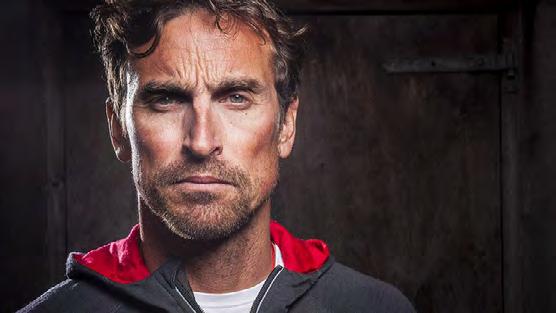





FRESH CONTENT EVERY FORTNIGHT
F e a t u r i n g i n t e r v i e w s w i t h k e y b u s i n e s s , s p o r t a n d l i f e s t y l e l e a d e r s i n S i n g a p o r e , A S E A N a n d t h e U K , t o p i c a l c o n v e r s a t i o n s a n d i n - d e p t h c o n t e n t . A F E W O F O U R F E A T U R E D G U E S T S Kenton Cool Mountaineer & Adventurer B R I T C H A M . O R G . S G / P O D C A S T S AVAILABLE ON ALL PODCAST PLATFORMS Claire
Joseph
150+ EPISODES AVAILABLE NOW NEW RELEASE EVERY FORTNIGHT SUBSCRIBE FOR FREE
THE BRITCHAM SINGAPORE PODCAST
Williams OBE Former Deputy Team Principal, Williams F1 Team
Singapore's Chie for Climate Change Yvonne Tham CEO, The Esplanade Co

















 Hosting Minister for Manpower Tan See Leng in our office, November 2022
The Great British Ball, December 2022
Sustainability reporting roundtable with the University of Birmingham, November 2022
Leadership Trust roundtable with Lord Westbury MBE, January 2023
Chinese New Year Networking, January 2023
Hosting Minister for Manpower Tan See Leng in our office, November 2022
The Great British Ball, December 2022
Sustainability reporting roundtable with the University of Birmingham, November 2022
Leadership Trust roundtable with Lord Westbury MBE, January 2023
Chinese New Year Networking, January 2023




































 by Tim
by Tim









 by Steve Nunez Head of Data & AI, Zühlke Asia
by Steve Nunez Head of Data & AI, Zühlke Asia























